

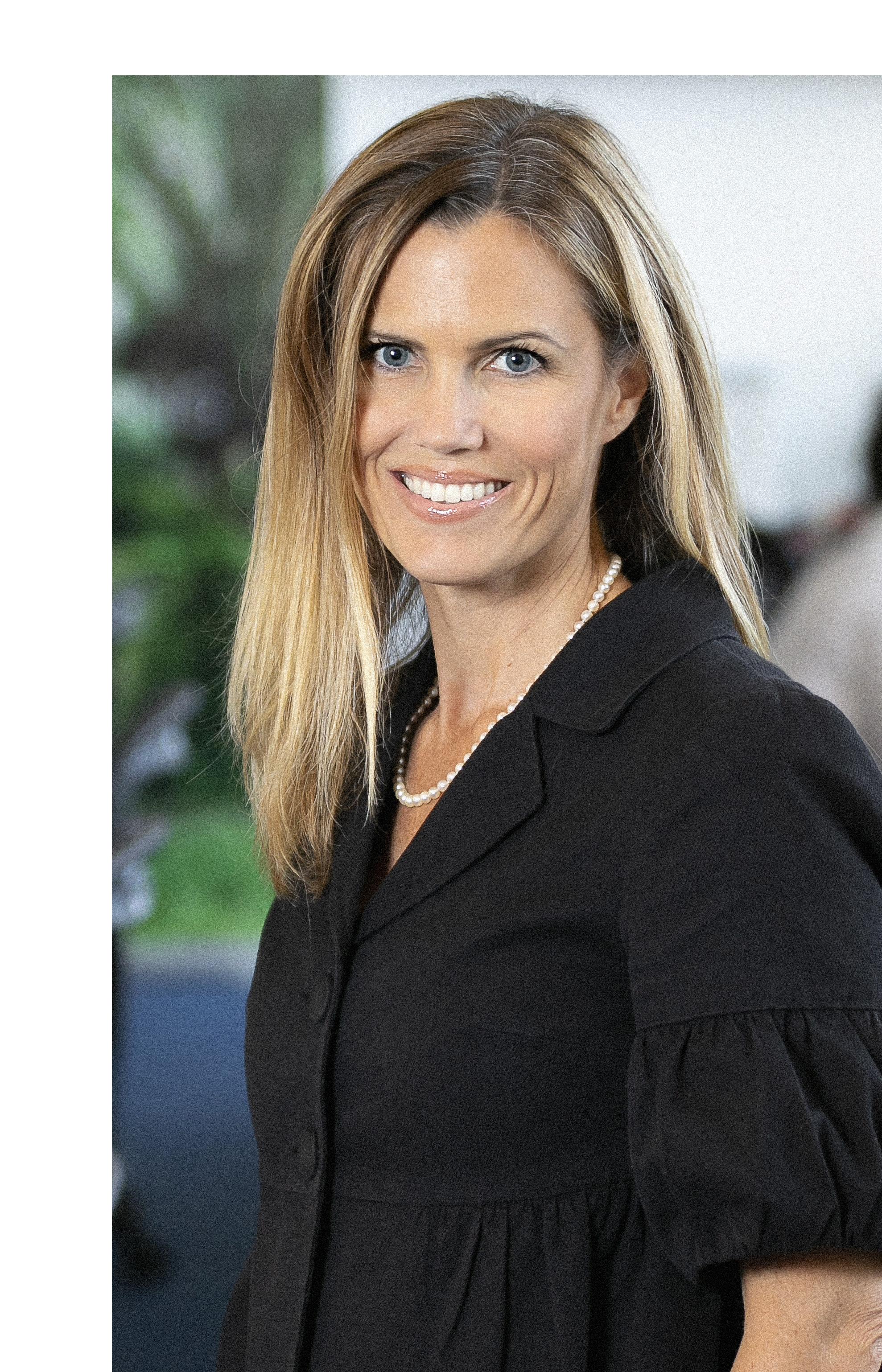






At Nagarro, we harness AI and cutting-edge digital engineering to drive transformation, resilience, and growth. With a forward-thinking and client-first mindset, we help businesses become digital-first, ensuring they stay ahead in an ever-evolving world.
With 18,000+ experts across 38 countries, we are trusted by 1,000+ global clients to deliver innovation at scale. Our deep expertise in AI, cloud, and modern engineering accelerates success—today and for the future.
Let’s build your future together.

Fluidic Enterprise nagarro.com

Over four days, the Strategic Conference will convene some of the world’s most influential voices to delve into critical topics and solutions connecting energy action to global progress and prosperity.
The Technical Conferences bring together the brightest minds and technical experts from across the energy value chain – the changemakers at the forefront of engineering, technology, and industry innovation.
Jamie Waite
CEO, EMG | Enquirer Media Group jamie.waite@busenq.com
Roisin Brennand
Chief Operations Officer roisin.brennand@busenq.com
Mark Cawston
Chief Commercial Officer mark.cawston@busenq.com
MEDIA
Gary Smith
Senior Project Director gary.smith@busenq.com
Jess Collins
Director Of Media and PR jess.collins@busenq.com
Rupert Kay Commercial Director UK rupert.director@busenq.com
Adel Mhiri
Project Director adel.m@busenq.com
Paris Cressy Branding & Marketing Executive paris.cressy@busenq.com
Glen Newton Project Director g.newton@busenq.com
Verity Kay
Project Director verity.kay@busenq.com
Naeem Patel
Project Director naeem.patel@busenq.com
Bryonie Knowles
Project Director b.knowles@busenq.com
Claire Dunn Global Credit Controller claire.dunn@busenq.com
Bethany Waite Credit Controller bethany.waite@busenq.com
Tanya Rudd Head of Finance tanya.rudd@busenq.com
Natoya Rimmer Global Head of Accounts natoya.rimmer@busenq.com
Dan Reeves Head of Data dan.reeves@busenq.com
Kumar Nil-Khan Senior Data Strategy kumar.nilkhan@busenq.com
Simon Ferrening Production Manager Commercial Performance Analysis
Anita Terrell Social Media Manager anita.terrell@busenq.com
Lee Dixon Social Media Manager lee.dixon@busenq.com
HR
Susan Tumelty HR Partnered Company info@hrdept.co.uk

Laura Green Editor in Chief laura.green@busenq.com
Ellie Perry Business Editor ellie.perry@busenq.com
Catherine Lafferty Business Editor catherine.lafferty@busenq.com
PRODUCTION
Remo Savino Production Assistant remo.savino@busenq.com
Jamie Bolton Head of Design jamie.bolton@busenq.com
Didie Nturo Head of Video & Content Creation didie.nturo@busenq.com
Matt Hardwick Online Website Manager matt.hardwick@busenq.com
Didie Nturo Lead Photographer didie.nturo@busenq.com DESIGN WEBSITE PHOTOGRAPHY
Chloe Bird Birketts LLP Norwich LEGAL


Welcome to the June Edition of Business Enquirer Magazine, Issue 138
As we reach the halfway point of 2025, it’s clear that industries around the world aren’t just changing, they’re being reshaped. In this month’s edition of Business Enquirer, we bring you stories of people and organisations that are doing just that—reimagining what progress looks like through innovation, purpose, and determination.
We begin with Driving the Low-Carbon Future: SCB Environmental Markets’ Bethanie Castelnuovo on Sustainability, Innovation and Leadership. At a time when sustainability is more than just a buzzword, Bethanie Castelnuovo is showing what it means to lead with both heart and expertise. After more than 15 years with SCB, she now wears two hats—Chief Financial Officer and Executive Director—and plays a key role in helping the company push forward its mission to support the global shift to a low-carbon future. One of her proudest achievements has been building SCB’s sustainability advisory team, helping clients across the globe not only measure their carbon footprints, but also take meaningful steps towards real climate action. It’s a brilliant example of purpose meeting performance.
We’re also proud to introduce the Top 10 Startup Founders to Watch in 2025. These are the bright minds and bold voices who are building the future, one idea at a time. From clean tech and AI to digital health and fintech, these founders are creating businesses that are agile, ambitious, and grounded in impact. They’re not just launching products, they’re shaping entirely new ways of thinking—and they’re just getting started.
Turning to the Caribbean, we mark a major milestone with Mareno Marine: Celebrating 40 Years of Excellence, Innovation and Sustainable Growth. This family-run business, founded by David and his brother, has been at the heart of marine and piling construction across the region for four decades. Now with the next generation involved, the company continues to deliver top-tier projects while keeping sustainability and strong local relationships front and centre. David reflects on the early days with pride, but it’s clear the future is just as important. With deep roots across the islands and a reputation built on trust, Mareno Marine is looking ahead with confidence and purpose.
From climate-focused finance and next-generation entrepreneurship to enduring craftsmanship in construction, this issue celebrates the people and ideas that are moving the world forward. These stories aren’t just about business success—they’re about vision, values and the drive to make a lasting difference. We hope you enjoy the read.
If you have a business story you wish to share in 2025, please contact our Head of Production via production@busenq.com




The editor and publishers do not guarantee the accuracy of statements made by contributers or advertisers, or accept responsibilty for any statement they express in this publication. The opinion of the contributors may not necessarily be the opinion of the editor or publishers. All content including the presentation therof in this magazine is the property of BE Media and protected by internation al copyright laws. You may not copy, reproduce, distribute, transmit, modify, create derivitave works, or in any other way exploit any part of copyrighted material without prior written permission from BE Media ©BE Media
LEADERSHIP IN THE DIGITAL ERA NEWS 014
SUSTAINABILITY THROUGH INNOVATION NEWS 018
THE IMPACT OF GEOPOLITICS ON MARKETS NEWS 022
030 THIS MONTH’S
BUSINESS PARTNER UPDATES 008
INTERNATIONAL HOTEL GROUP
IHG HOTELS & RESORTS CONTINUES EXPANSION IN INDIA WITH A NEW HOLIDAY INN EXPRESS SIGNING
IYC
THE ALLURE OF SAILING: WHY A SAILING YACHT SHOULD BE YOUR NEXT INVESTMENT
THE RISE OF FINTECH NEWS 026
TROPICAL GENERAL INVESTMENTS GROUP 048
BUILDING LONG-TERM SUCCESS THROUGH LOCAL INSIGHT AND GLOBAL AMBITION
056
CELEBRATING 40 YEARS OF EXCELLENCE, INNOVATION, AND SUSTAINABLE GROWTH MARENCO MARINE
GRANTLEY ADAMS INTERNATIONAL AIRPORT INC SULAPAC ABU DHABI MOBILITY 064 078 086
A SUSTAINABLE ALTERNATIVE TO PLASTIC LEADING THE BIOMATERIALS REVOLUTION IN 2025
A VISION FOR TOMORROW
DRIVING THE FUTURE: HOW ABU DHABI MOBILITY IS SHAPING THE SMART TRANSPORT REVOLUTION
BETHANIE CASTELNUOVO
SCB’S
VISIONARY VOICE




Holiday Inn Express & Suites Pithampur, Madhya Pradesh will cater to growing demand from the region’s thriving industrial and automotive sectors.
India, 02 June 2025: IHG® Hotels & Resorts, one of the world’s leading hotel companies, has signed a management agreement with Kevit Retreats Private Limited for the development of Holiday Inn Express & Suites Pithampur. Scheduled to open in the first quarter of 2028, the hotel reflects the brand’s strategic focus on growing in high demand markets and bridging the gap for quality branded hospitality in secondary markets in India.
Holiday Inn Express®, IHG’s largest and fastest-growing hotel brand with over 3,200 hotels worldwide, is designed to keep travel simple and smart. The brand continues to be the first choice for a growing number of travellers seeking a convenient, engaging place to rest, recharge and work. Focused on delivering more where it matters most, Holiday Inn Express offers streamlined service, modern design and comfortable accommodation at every stage of the journey. With the introduction of its future ready Generation 5 concept, the brand is elevating the guest experience through flexible design and exceptional value, further reinforcing its position as a category leader across EMEAA.

Located in Pithampur, part of the rapidly expanding Indore Metropolitan Region, Holiday Inn Express & Suites Pithampur will be part of a large-scale mixed-use development comprising industrial, logistics, and warehousing facilities. This prime positioning will allow the hotel to cater to a diverse and growing base of business travellers visiting the region’s industrial and automotive clusters. The hotel will feature 150 well-appointed rooms, two dining options, modern meeting spaces, a fitness centre, and ample parking, offering guests a smart, comfortable, and efficient stay experience.
Commenting on the signing, Sudeep Jain, Managing Director, South West Asia, IHG Hotels & Resorts, said, “The signing of Holiday Inn Express & Suites Pithampur reinforces our focus on tapping into new markets and bridging the gap for world class branded hospitality experiences. Pithampur, located in Madhya Pradesh, has emerged as a key industrial powerhouse, particularly in the automotive and pharmaceutical sectors. The growing volume of business travel into the region makes it an ideal location for a brand like Holiday Inn Express, which is designed to meet the needs of today’s short-stay, purpose-driven travellers. We are pleased to partner with Kevit Retreats Private Limited for this upcoming project.”
Mr. Aditya Agarwal, Kevit Retreats Private Limited, added, “We are proud to partner with IHG Hotels & Resorts to bring

the Holiday Inn Express & Suites brand to Pithampur. As the region continues to transform into a core economic zone for central India, we see strong potential for quality accommodation that meets international standards. With IHG’s global expertise and brand recognition, we are confident the hotel will emerge as a preferred choice for business travellers.”
Located in Madhya Pradesh, Pithampur is recognized as one of central India’s leading industrial zones, housing a dense concentration of major automobile and pharmaceutical companies. It is also home to NATRAX, one of Asia’s largest automotive testing facilities, which attracts a wide range of automotive professionals
and industry stakeholders. Additionally, Pithampur features India’s first greenfield Special Economic Zone (SEZ), further reinforcing its position as a high-potential business hub. These key developments serve as major demand drivers for quality hospitality infrastructure, making the location well-suited for a globally recognized hotel brand.
IHG® currently has 50 hotels operating across six brands in India, including Six Senses, InterContinental Hotels and Resorts®, Crowne Plaza®, voco™ Hotels, Holiday Inn Resort® and Holiday Inn Express®, and a strong pipeline of 63 hotels due to open in the next 3-5 years. www.ihgplc.com
Owning a sailing yacht has long been more about the lifestyle it provides than anything else. Sailing offers plenty of opportunities to connect more with the ocean, for unique experiences, and the sense of freedom and independence it brings.
We spoke with our expert Sales Consultant, Jamie Swaine, to explore what makes sailing yachts such an excellent choice for ownership and to shine a spotlight on some of our latest sailing yachts for sale.
For sailing yacht owners, it is as much about the journey as the destination. No matter where you sail, from the Mediterranean to the Caribbean, it offers an immersive and rewarding experience.
“When you own a sailing yacht, you’re not just buying a vessel, you’re buying into a way of life,” says Jamie. “There’s something incredibly compelling about moving across the water under sail, driven purely by harnessing the wind.” Relying on wind-powered propulsion allows you to cover vast distances and heightens your understanding of nature and connection to the ocean. “It’s a very different relationship with the oceans, and allows owners to still have that connection with ‘yachting’ as an activity as opposed to an
asset ownership experience,” he explains. A well-designed sailing yacht, like the ones currently listed for sale with IYC, offer a feeling of security and self-sufficiency that’s not easily replicated.
When comparing owning sailing and motor yachts, Jamie mentions there are “two different mindsets.” Both types of yachts for sale offer adventure and luxury intertwined; however, the experience hugely differs. “Motor yachts are about speed, luxury, and effortless travel. You have the freedom to cover large distances quickly with a focus on comfort and amenities,” he says. However, the flip side he points out is the cost and logistics of fueling.
According to Jamie, sailing yachts offer “more engagement with your environment, and it’s about seamanship and reading the conditions.” Sailing yacht owners tend to feel more connected to the ocean and embrace nature’s elements. Engineering factors also play a part in the differences; sailing yachts have a lighter engineering load than highperformance motor yachts; however, they require additional considerations for sails and rigging. The sailing yacht category includes various yachts with differing ownership experiences, from monohulls

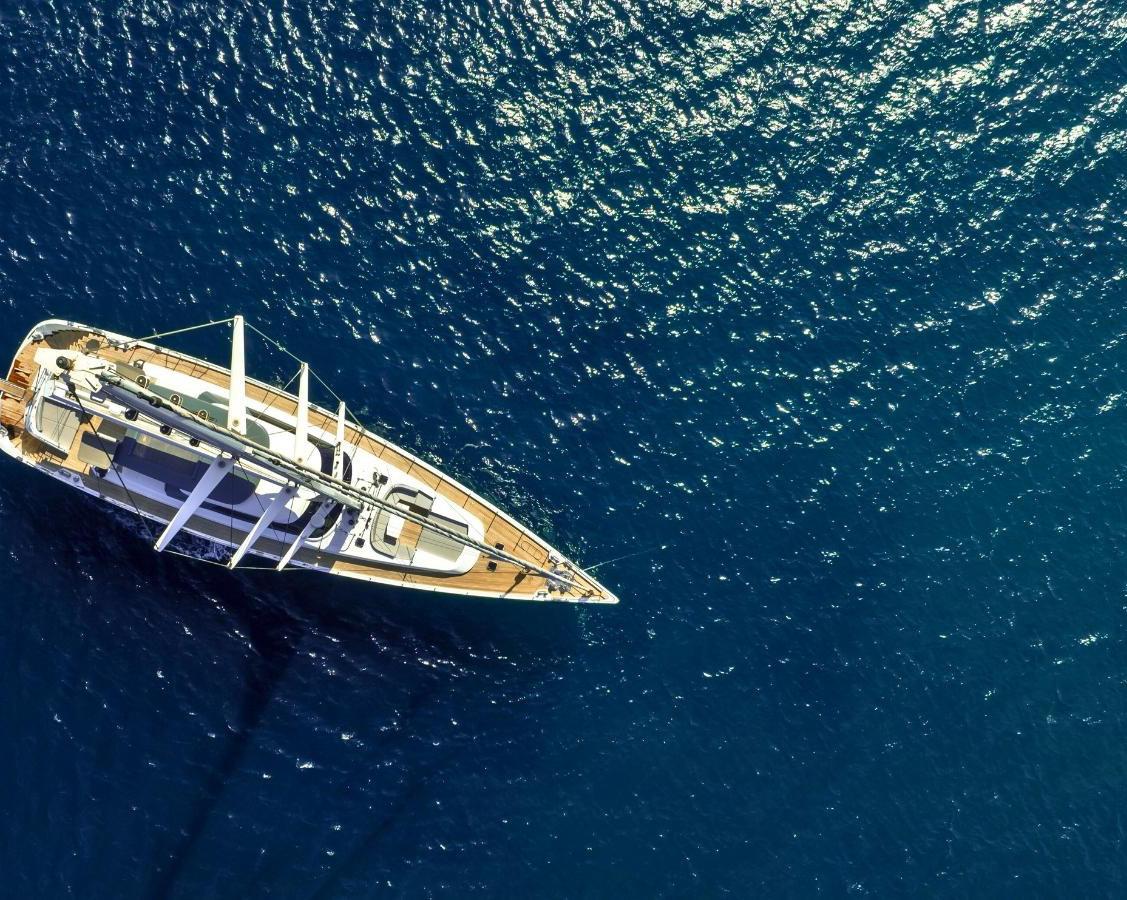
to multihulls, contemporary to classic, and motor sailors; IYC has a range of these sailing yachts currently for sale.
Among the sailing yachts for sale with IYC, the 100’5 (30.6m) JASMINA III is a top choice for current, prospective sailing yacht owners. As a 30-meter steel yacht with an aluminum superstructure, the sailing yacht is asking €2,950,000. Jamie describes the yacht as “genuinely a standout offering in today’s sailing market.” The yacht’s current owner, a repeat client of the ARK Yachts shipyard, worked closely with them to create the ideal sailing yacht for up to eight guests. “Her owner is fastidious, and
he designed her with the manufacturer to ensure her GA and specification are as perfect as possible,” he adds.
Appealing to a diverse group of owners, from seasoned to first-time owners with crew, Jamie explains: “She’s an agile displacement yacht, so she’s best suited to someone with some sailing experience or an owner willing to retain a couple of professional crew.” Notable features include a deep, secure cockpit perfect for offshore sailing. Ideal for long-term cruising endeavors, JASMINA III has a thoughtful layout and a host of liveability features, including a spacious full-beam master client. “She’s turn-key with a fresh 2024/25 winter refit, ready for cruising,” he adds.
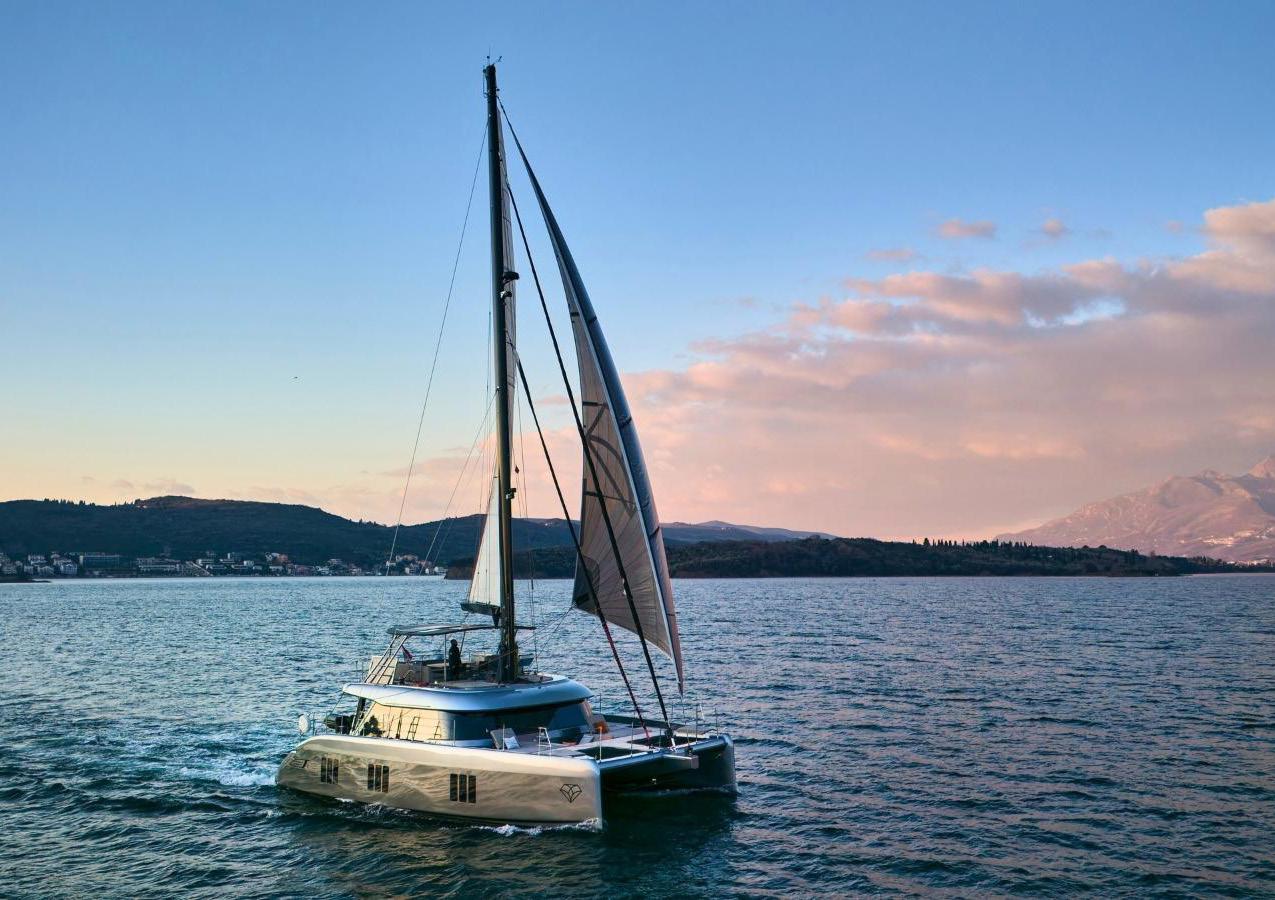
From monohulls to catamarans, the Sunreef 50 LUCY for sale offers another sailing experience. “LUCY is about comfort, efficiency, and luxury,” Jamie states. “With over 167 square meters of living spaces, she offers extensive guest areas and is remarkably stable under sail and at anchor,” he adds. Asking €2,700,000, with VAT paid, this Sunreef catamaran has only had one owner from new in 2021.
The yacht offers an excellent opportunity for prospective sailing yacht owners seeking a long-term cruising option. Jamie explains: “Technically, she’s been extensively upgraded with lithium batteries, high-capacity solar arrays, and a powerful, easily managed sail plan, making her an excellent option for owners who want genuine self-sufficiency and a refined sailing experience.”
The sailing yacht market is consistently evolving, and there have been notable shifts in the kind of buyers the sailing market is attracting. As Jamies notes: “Historically, these yachts appealed primarily to experienced sailors. Today, we’re seeing a much more diverse buyer pool, including first-time yacht owners drawn by the lifestyle and the appeal of slow, responsible travel.” Younger buyers, adventurous families, and those seeking greater autonomy increasingly turn to sailing yachts as a getaway for meaningful escapism and connection to nature.
“There’s a greater desire for sustainability,” Jamie explains. “Sailing yachts, by nature, have a significantly lower carbon footprint than motor yachts. The ability


to cruise under wind power alone is hugely appealing to environmentally conscious buyers.” Modern sailing yachts also typically integrate renewable energy technologies, from solar panels to lithiumion batteries, allowing owners to minimize generator hours, operate off-grid, and cruise quietly.
The 170’7” (52m) Tramontana sailing yacht REPOSADO, also currently for sale, is an excellent example of including greener credentials. This motor sailor has been designed for responsible luxury with various eco-friendly features and lower consumption.
A longstanding misconception is that sailing yachts require extensive experience and constant work. However, advancements in technology have dramatically increased accessibility. “With systems like electric winches, hydraulic furling systems, bow and stern thrusters, advanced autopilots, and fully integrated navigation suites, today’s sailing yachts are remarkably manageable,” explains Jamie. Many are specifically designed for shorthanded or minimal crew operation, offering ease without compromising
performance or safety. Classic designs like the sailing yacht for sale, the 137’10” (42m) ARKTOS, combined the charm of traditional schooners but modern amenities, technology, and convenience combined.
When considering purchasing a sailing yacht, it’s important to define its potential usage as clearly as possible - from highlatitude exploration to ocean crossing to leisurely weekends. Jamie advises: “Your intended cruising style will determine the right yacht. Whether that’s a highperformance monohull for fast passage making, a robust bluewater cruiser built for safety and autonomy, or a spacious multihull offering greater comfort and stability at anchor.”
As Jamie concludes: “Sailing rewards involvement, and the sense of achievement, independence, and connection you gain is unlike anything else. It’s an experience that stays with you long after the sails are down.” If you are interested to learn more about sailing yacht ownership or for more information on IYC’s sailing yachts for sale, contact our expert consultants today. www.iyc.com
In today’s rapidly shifting digital landscape, leadership has transcended traditional models of hierarchy and command. The business world is being reshaped by digital transformation, remote collaboration, generative AI, and a heightened emphasis on agility, empathy, and innovation. In this brave new world, leadership is no longer about simply managing resources or overseeing operations; it’s about setting a vision, enabling dynamic teams, and championing the human aspects of work amidst increasing automation.
As we step into 2025, the qualities and capabilities expected of leaders are evolving at pace. Today’s most effective leaders are not just technology literate they are digitally fluent, culturally aware, and emotionally intelligent. They move seamlessly between in-person and digital spaces, speak the language of data and purpose with equal confidence, and understand that successful transformation is as much about mindset as it is about infrastructure.
This new era of leadership is defined by those who can turn disruption into opportunity. The shift to hybrid work, the rapid adoption of AI tools, and the increasing urgency around sustainability have created an environment in which adaptability and foresight are paramount. The leaders emerging today are characterised not just by their titles, but by their ability to inspire trust, enable innovation, and create inclusive cultures where people feel empowered to contribute.
The digital economy rewards those who can anticipate trends, act quickly and maintain ethical grounding. These emerging leaders combine commercial acumen with deep awareness of global dynamics, regulatory environments, and stakeholder expectations. They are as comfortable on social platforms as they are in boardrooms, leveraging influence across digital ecosystems and cultivating authentic voices in an age of increasing transparency.
Crucially, these leaders understand that success in the digital age requires collaboration over control. The most successful digital-era leaders have shifted from a directive approach to one that empowers people at all levels of the organisation. They trust their teams to experiment, fail fast, and iterate. They build resilience not by avoiding risk, but by fostering a culture in which learning is continuous and every challenge is an opportunity for growth.
What sets the next wave of leadership apart is also a renewed focus on purpose and social impact. Whether leading a tech start-up or a global enterprise, today’s most respected leaders are integrating sustainability, diversity, and community impact into the core of business strategy. They recognise that value creation in the digital economy is multidimensional measured not only by shareholder returns but also by environmental stewardship, ethical governance, and meaningful societal contribution.


In many cases, digital-era leaders are not confined by geography or conventional corporate paths. They are emerging from diverse industries, educational backgrounds, and entrepreneurial ecosystems. This diversity is not incidental it is a strength. In a world where innovation increasingly comes from the edges, inclusive leadership is not just good ethics, it is smart business.
Some of the most exciting leaders to watch in 2025 are those at the intersection of digital and human progress. Whether championing responsible AI, driving breakthroughs in green technology, or reimagining customer experience through immersive platforms, these leaders are reshaping their industries and, in many cases, redefining what it means to lead.
Leadership in this era is about balancing speed with reflection, innovation with integrity, and ambition with responsibility. It is about knowing when to push forward and when to pause. It is about having the humility to listen, the confidence to act, and the vision to see beyond the immediate.
As the Business Enquirer audience looks ahead to the trends, talent and transformations shaping the corporate world, the spotlight on digital-era leadership is sharper than ever. These are the voices and visionaries setting the tone for what’s next. Whether they are shaping policy, driving enterprise-wide transformation, or mentoring the next generation, they are proving that in the digital age, great leadership is not about knowing all the answers it’s about asking the right questions and creating the conditions for collective success.
Leadership in 2025 is fluid, responsive, and deeply human. It is not reserved for the few, but accessible to the many who are willing to lead with clarity, courage, and curiosity. In this front-of-book spotlight, we celebrate the thinkers and doers setting new standards for what it means to lead in a world that is constantly being redefined by technology and possibility.




As global industries recalibrate in the face of mounting environmental pressures, 2025 emerges as a pivotal year for transformative change. No longer a niche ideal tethered to public relations or compliance, sustainability has become a core business imperative—one increasingly driven by innovation.
Across sectors—from manufacturing and mobility to finance and food systems—bold new technologies and philosophies are weaving sustainability into operations. This shift is not merely a response to climate risk but an embrace of opportunity as a path to resilience and growth.
The focus in 2025 is not on incremental tweaks but on next-generation thinking. Leaders are investing in decarbonisation, systems redesign, circularity, and regenerative models aligning business success with planetary health.
The traditional linear model of take, make, and dispose is giving way to circular design principles that embed reuse and recycling from the start. The new frontier lies in designing products and services that never become waste.
Some of the most compelling innovations are happening at the materials level. Startups are developing bio-based alternatives to plastics, metals, and textiles—derived from mushrooms, algae, hemp, and food waste. These aren’t just substitutes but high-performance materials with new use-cases, like seaweed-based packaging that’s compostable in weeks.
In mobility, the emphasis goes far beyond electric vehicles. 2025 marks a turning point in multi-modal ecosystems where bikes, scooters, buses, and walking are digitally integrated. Advances in battery recycling and second-life applications are also addressing EV sustainability concerns.
The energy sector is evolving with renewable expansion paired with

storage innovations, grid intelligence, and decentralised systems. AI-managed microgrids, especially in regions prone to instability, are enabling resilience and autonomy.
Even heavy industry—long seen as hardto-abate—is embracing transformation. Steel, cement, and chemical sectors are attracting investment in green hydrogen, carbon capture, and low-carbon production methods. Though capitalintensive, this signals overdue change in high-emission sectors.
Finance plays a catalytic role, with capital flowing into regenerative agriculture, nature-based solutions, and climate fintech. Tokenised carbon credits and blockchain-backed ESG tools are delivering trust and transparency at scale.
Agriculture and food systems are also being reimagined. AI, sensors, and drones power precision farming, while vertical farms and lab-grown proteins scale up. Yet the deeper shift lies in systems thinking that connects food with health, equity, and biodiversity.
In architecture, design is evolving for positive impact—carbon-absorbing buildings, rainwater harvesting, and urban biodiversity corridors. Innovations like timber skyscrapers and carbon-negative concrete are becoming architectural reality.
Sustainability is now a core workforce skill. In 2025, it spans departments— from design to marketing—with climate literacy and systems thinking as essential capabilities. Innovation teams are increasingly interdisciplinary.
Community collaboration is equally critical. Indigenous knowledge, long overlooked, is gaining new relevance in forest stewardship, watershed restoration, and food system resilience. Co-creation is proving more sustainable and more just.
Brands, under pressure from savvy consumers, are shifting from

greenwashing to transparency. Interactive labeling, digital twins, and AR tools are being used to show full product life cycles.
Governments, too, are evolving. Regulation now encourages innovation—through green procurement, public-private partnerships, and climate tech accelerators. Regulatory sandboxes are enabling new models to emerge safely.
Yet challenges persist. Innovation can outpace ethics and regulation. AI can predict deforestation or optimise logistics— but can also entrench bias or increase energy use. The goal must be to ensure technology serves people and the planet, not just profit.
Another risk is fragmentation. Siloed sustainability efforts may lead to unintended harm. A carbon-neutral product is no victory if it degrades ecosystems or exploits labour. The most powerful innovations will be those that integrate across sectors and embed sustainability at every level.
The common thread across these developments is systems innovation. Solving for carbon alone is no longer sufficient. Businesses that thrive in this new era will be those willing to embrace complexity and redesign not just their products, but their purpose.
In 2025, the race is not to appear the greenest—but to act the most adaptively. Sustainability is evolving from a compliance measure into a catalyst for reinvention. The standout companies will be those that see the climate crisis as a strategic opportunity to reimagine progress.
Innovation is no silver bullet. It cannot replace political will or consumer choices. But it can catalyse transformation—turning ideas into infrastructure and intentions into impact. And in 2025, it’s doing just that, with creativity, courage, and a new kind of capitalism beginning to take root.
As the world steps further into a decade defined by uncertainty and transition, the relationship between geopolitics and market behaviour is becoming increasingly interwoven. For global business leaders and strategists, understanding the geopolitical landscape in 2025 is no longer academic—it’s essential for managing risk and seizing opportunity.
Recent years have shown how political shifts, conflicts, and trade policies can rapidly reshape the economic terrain. While geopolitics has always influenced markets, the pace and complexity of change now demand a higher level of vigilance and adaptability.
A defining feature of today’s environment is the decline of a singular global hegemon. In its place is a multipolar order, where regional powers assert their interests and global institutions face fragmentation. This is creating new tensions and recalibrations.
For businesses, this means navigating a mosaic of regulatory environments and political priorities. Markets once seen as stable may now carry hidden volatility, while others gain prominence due to resource access or demographics.
The impact of geopolitics is perhaps most tangible in global trade. Reshoring, nearshoring, and friendshoring are redrawing supply chains, not just for efficiency but for resilience and alignment with political values.
Industries like semiconductors, critical minerals, and renewable energy are shifting closer to home or to politically aligned regions. Southeast Asia, Latin America, and Eastern Europe are gaining traction, but infrastructure and governance remain critical variables.
Energy remains both a barometer and a
driver of geopolitical tension. The shift to cleaner energy is reshaping international relations. Lithium, cobalt, and rare earth elements are now as significant as oil. Resource-rich countries are asserting more control, while others race to diversify supply and boost domestic capabilities.
Fossil fuel markets still react sharply to conflict and sanctions. Meanwhile, tools like carbon tariffs, green subsidies, and climate finance are becoming instruments of geopolitical influence, shaping industrial policy and market access.
Technology is another key arena where economics and national security overlap. Competition in AI, quantum computing, and biotech is intensifying. Regulatory divergence—on data, chips, and privacy—is fragmenting digital markets.
This affects investment, partnerships, and talent mobility. Strategic industries face heightened scrutiny, with the risk of forced decoupling as political winds shift. Cybersecurity and disinformation further complicate the landscape, with potential disruptions to financial systems and consumer trust.
Finance is being used more actively as a geopolitical tool. Sanctions, capital controls, and restrictions are now standard instruments of influence, prompting reassessments of exposure and risk.
Alternative payment systems are emerging, including digital currencies and bilateral trade networks that bypass traditional financial centers. These could reshape capital markets, though they also carry risks of instability and reduced transparency.
Several regions are under the microscope in 2025. In the Middle East, energy markets remain sensitive to conflict. In the Asia-




Pacific, maritime trade routes and military tensions are central to business planning.
Africa is emerging as a focal point for both competition and investment, with opportunities in infrastructure and digital expansion. Latin America offers key resources but also presents political and economic volatility.
Successful companies are embedding geopolitical awareness into strategic planning. Scenario analysis, resilience audits, and stakeholder mapping are now part of the corporate toolkit. Diversification of markets and supply chains is becoming standard.
More firms are appointing geopolitical advisors and forming internal task forces. Boards are engaging more directly, recognising that geopolitics is now a core strategic concern.
Equally important is building trust. In a politicised environment, companies seen as responsible and transparent are more likely to maintain their social licence to operate.
The convergence of geopolitical turbulence and market transformation defines 2025. The risks—from regulatory friction to reputational fallout—are real. Yet within the uncertainty lies strategic opportunity.
Companies that invest in intelligence, resilience, and foresight will be best positioned to thrive. Geopolitics is ultimately about systems, resources, and the narratives we tell about our place in the world.
Markets do not operate in isolation. They are shaped by history, diplomacy, and cultural forces. As those forces grow more dynamic, so too must global business strategies. 2025 is not just another year—it’s a crucible of change, and those who pay close attention may gain their most valuable insights not from the trading floor, but from the shifting tides of global affairs.
As the global financial landscape continues to evolve, 2025 is shaping up to be a milestone year for fintech. What began as a niche disruption in payments and lending has grown into a foundational shift in how individuals, businesses, and institutions engage with money. From personal finance apps and digital banks to blockchain infrastructure and AI-driven investment platforms, fintech is no longer a side story—it’s the main stage.
The rise of fintech reflects more than technology. It signals a deeper rethinking of trust, access, and value. It also reveals impatience with outdated models and institutions out of step with the speed and values of today’s economy. In this context, fintech is not just innovation—it’s a recalibration of financial services for a digital, decentralised, and demanding world.
Accessibility remains one of fintech’s most powerful narratives. Financial inclusion is both a mission and a business strategy. Traditional banking has often failed to reach certain populations due to geography, credit history, or bureaucracy. Fintech is filling these gaps with mobilefirst solutions that bypass bricks and mortar.
In 2025, app-based services enable users to open accounts, transfer funds, and access credit with just a few taps. Peerto-peer lending, micro-investing, and embedded tools offer opportunities once out of reach. These shifts are reshaping
market dynamics by creating new customers, data, and behaviours.
Digital identity and authentication systems are playing a crucial role. Secure identity verification enables participation regardless of location or prior history. This is unlocking new forms of entrepreneurship across both emerging markets and urban centres.
One of the most transformative trends is embedded finance. Financial services are no longer exclusive to banks— they’re woven into platforms and daily experiences. Ride-hailing apps offer insurance, retailers provide credit, and freelancer platforms manage income smoothing.
This modular, API-driven approach is changing the structure of the industry. Non-financial companies are entering the ecosystem, forcing incumbents to rethink their models, partnerships, and relevance.
Regulatory frameworks are adapting. The definition of a financial provider is becoming more fluid, with regulators focusing on outcomes and consumer protection rather than legacy categories. This flexibility enables innovation while demanding greater transparency and accountability.
AI now powers some of fintech’s most valuable features—from budgeting


tools to fraud detection and algorithmic trading. In 2025, AI chatbots handle customer service with nuance, and machine learning assesses creditworthiness using alternative data, driving more inclusive lending.
AI-driven platforms are offering tailored investment advice once reserved for the wealthy. Yet these advancements require responsible oversight. Ethical use of data, bias prevention, and algorithm transparency are becoming key differentiators. Trust in AI is now as important as performance.
Blockchain and Infrastructure Evolution Blockchain is maturing into core financial infrastructure. Beyond cryptocurrencies, distributed ledger tech is reducing costs and enhancing transparency in crossborder payments, trade finance, and asset tokenisation.
Central banks are exploring digital currencies that could reshape monetary systems. This has implications for liquidity, risk, and intermediaries. Meanwhile, decentralised finance is experimenting with peer-to-peer protocols that challenge traditional financial institutions.
Smart contracts, digital ID, and compliance automation are streamlining processes once bogged down by layers of verification—bringing real-time execution and built-in accountability to complex transactions.
Modern consumers expect financial services to be seamless, intuitive, and immediate. Trust is no longer earned by brand legacy, but by relevance, reliability, and experience.
Fintech firms that prioritise transparency and user-centric design are gaining market share. Incumbents must rapidly modernise to stay competitive. Younger generations, in particular, demand ethical alignment and are more open to datadriven, automated solutions—provided they are secure and clear.
Fintech investment is shifting from earlystage buzz to strategic scale. Investors seek clear profitability paths and proven customer bases. M&A activity is increasing as firms seek to expand capabilities and reach.
Tech giants are entering financial services, while banks are acquiring fintech platforms and talent. Niche players continue to succeed by addressing underserved markets with precision.
Sustainability and impact are now part of investment criteria. Fintechs tackling ESG challenges—such as ethical investing, financial literacy, or inclusive agriculture— are gaining traction for both innovation and purpose.
Fintech’s momentum in 2025 hinges on adaptability. Technology, regulation, and consumer expectations are evolving fast. Success will belong to those who can anticipate change, respond with agility, and build systems that are inclusive, secure, and transparent.
Fintech is no longer a vertical—it’s the lens through which financial activity is being redefined. For business leaders and investors, this is more than a trend— it’s the future of finance. Those who understand its dynamics and navigate its risks will not just stay relevant—they will shape what comes next.


In 2025, a new generation of startup founders is redefining the boundaries of innovation across sectors. These entrepreneurs are not only building successful ventures but also addressing pressing global challenges. Their diverse backgrounds and visionary approaches are shaping the future of technology, healthcare, sustainability, and more.
a British physician and entrepreneur, has made significant strides in the healthcare sector. As the founder of Cera, an AIled home healthcare company, he has transformed the delivery of care services, bringing them directly into patients' homes. His work has positioned Cera as a leading health tech company in the UK.
founder of Daye, is revolutionising gynaecological health. Her company introduced the world's first CBD-infused tampon and continues to innovate in women's health products, aiming to close the gender gap in medical research and innovation.




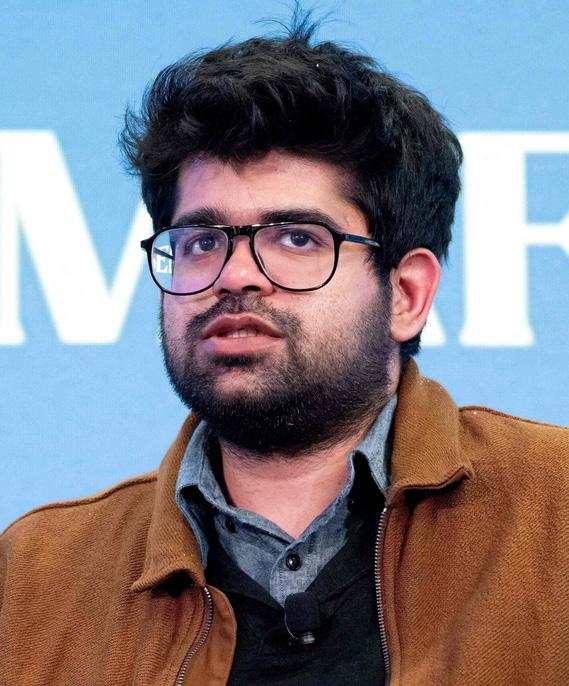
co-founder and CEO of Synthesia, leads the world’s foremost AI video creation platform. Synthesia enables businesses to produce professional-quality videos in multiple languages, streamlining content creation processes.
co-founder and CTO of Cado Security, is at the forefront of cybersecurity innovation. His platform offers cloud-native digital forensics and incident response solutions, enhancing organisations' abilities to tackle cyber threats effectively.
co-founder of Perplexity AI, has developed an AI-powered "answer engine" that provides direct, cited responses to user queries. His work aims to redefine how information is accessed and consumed online.
founder of DRIFT Energy, is pioneering mobile renewable energy solutions. His company utilises sailing vessels to harness ocean energy, producing green hydrogen and contributing to the global shift towards sustainable energy sources.
co-founder of CuspAI, is innovating in material science through AI. His platform allows users to search for materials with desired properties, facilitating the development of new materials essential for climate technologies.


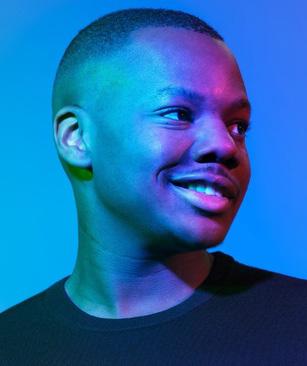

founder and CEO of Lalaland.ai, is using generative AI to create hyperrealistic digital models for fashion brands. His work promotes diversity and inclusivity in the fashion industry by offering a broader representation of models.
co-founder and CEO of Lottie, has created a platform that simplifies the process of finding and financing later-life care. His work addresses the challenges faced by families in navigating eldercare options.
co-founder and CTO of Fireflies.ai, has developed an AI-powered notetaker that records, transcribes, and analyses meetings. His technology enhances productivity and collaboration in professional settings.


These founders exemplify the spirit of innovation and resilience. Their ventures not only demonstrate commercial success but also contribute positively to society. As they continue to grow and influence their respective industries, they represent the dynamic and transformative potential of startups in 2025.


Chief Financial Officer and Executive Director,
At a time when sustainability has become both a strategic and moral imperative, few companies embody the intersection of environmental ambition and commercial intelligence quite like SCB Environmental Markets. At the heart of its operations is Bethanie Castelnuovo, who, after fifteen years with the organisation, now serves as both Chief Financial Officer and Executive Director. Castelnuovo’s leadership spans a wide range of disciplines—finance, operations, compliance and, crucially, sustainability— and her commitment to SCB’s mission to accelerate the global transition to a lowcarbon future is nothing short of personal.
Speaking with Business Enquirer from SCB’s headquarters, Castelnuovo exudes clarity, drive and an evident passion for the work her teams are undertaking. “No two days really look alike at SCB,” she
says. “And that’s one of the reasons I’ve been here so long. I thrive on variety, on the challenge, and the sense that we’re building something meaningful.” She credits much of her fulfilment to the culture at SCB: collaborative, accountable, and deeply invested in delivering results that matter. “What I’m most proud of is the team and culture we’ve built,” she adds. “SCB was a natural fit for me from the very beginning.”
Castelnuovo’s path into sustainability was shaped by her early career in the Big Four, but it’s at SCB that she has been able to merge that corporate rigour with purpose-led innovation. One of her most hands-on contributions has been the development and leadership of SCB’s sustainability advisory team—a natural extension of the firm’s core activities in low-carbon commodities and voluntary
carbon credit procurement. Castelnuovo and her colleagues noticed a consistent challenge among clients: an inability to account accurately for carbon emissions or report on climate actions with impact. “So, we built a team that could walk clients through the entire journey—from measuring baselines and setting targets, all the way to achieving net zero and reporting on it in a meaningful way.”
The emphasis throughout is on practical, real-world application. Castelnuovo has taken care to recruit professionals from accounting, technology and environmental backgrounds, ensuring the team is both multidisciplinary and grounded. That same pragmatism defines her leadership style. “Accountability is really important to me,” she says. “I have high expectations of myself and others, but I also believe in creating a space where people aren’t afraid to ask questions, solve problems together, and grow.”
As a woman in a senior leadership role, and one who works closely with women across tech and sustainability, Castelnuovo is deeply aware of both the progress and the gaps. “Sustainability tends to have a higher proportion of female leaders, but the challenge is often that teams are under-resourced or lacking a diversity of skills,” she explains. SCB has taken a proactive approach to this, building a high-performing AI and data team that is not only technically advanced but also female-led—an unfortunate rarity in the wider industry. “It matters,” Castelnuovo says plainly. “When new team members can look around and see successful women at different stages of their lives and careers, it’s easier for them to imagine themselves in those roles one day.”
That blend of diversity, forward thinking and operational effectiveness is perhaps most evident in one of SCB’s flagship innovations: CarbonAI. Launched as a data-driven analytics platform for global carbon markets, it’s a powerful example of how artificial intelligence can drive realworld environmental impact. “CarbonAI delivers pricing data and intelligence to sustainability managers, wherever carbon



Imagine building IKEA furniture without an instruction manual.
You have all the right pieces, and you know exactly how the finished product should look—but putting it all together feels overwhelming without clear guidance.
Many companies find themselves in a similar dilemma with AI: they're convinced of its potential and can envision the transformative outcomes, yet without clear directions, assembling their AI strategy becomes daunting.
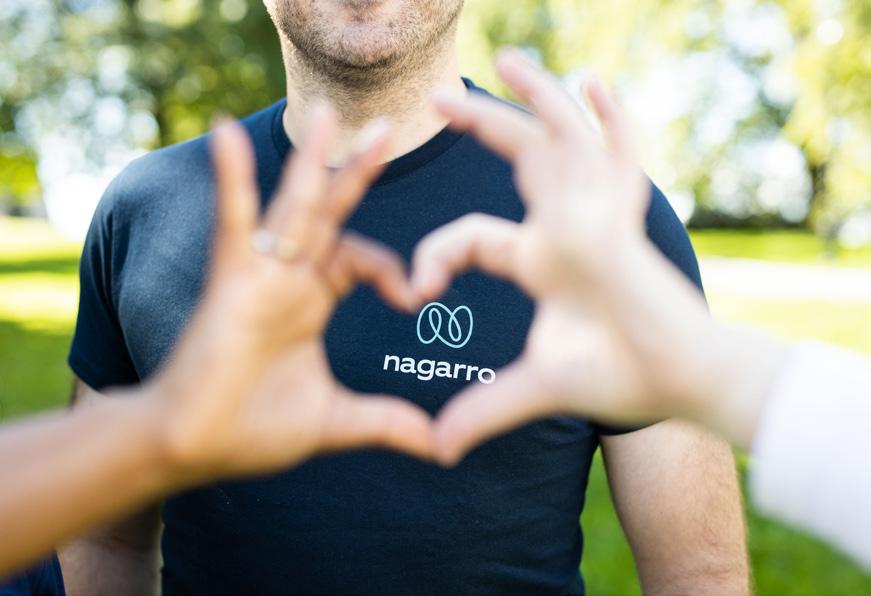
Organizations recognize AI's transformative potential across the three critical pillars of growth: enhanced decision-making, streamlined processes, and elevated customer experiences. But, to effectively harness this power, they require a clear strategic blueprint that illuminates the path forward.
In this piece, Deepak Nohwal, Global Head of Sports & Gaming at Nagarro, dives into how three GenAI-led playbooks, AI-powered immersive experiences, and intelligent ecosystems can transform organizational digital strategy, redefine customer engagement, and propel business growth.
AI-led playbooks: From Insights to Action
AI-powered playbooks enable organizations to coordinate intelligent strategies across platforms, facilitating multilingual interactions and seamlessly integrating various

products and services to optimize overall business performance.
Before discussing their enterprise benefits, what exactly are these playbooks?
GenAI playbooks are AI-powered, computation-friendly guides for solving complex B2B/B2C problems. These playbooks leverage GenAI's large language model infrastructure to:
• Integrate digital knowledge.
• Orchestrate existing ML models.
• Generate contextualized digital scenarios.
Playbooks are interactive, simulationcapable, connected to digital twins, supported by large language models, and understandable in natural human language. They offer a catalog of actionable steps that can be activated across channels
and devices, intelligently connecting products and services to maximize value.
An ideal playbook influences multiple organizational areas, transforming isolated applications into enterprisewide initiatives. For example, a sports club can use GenAI
playbooks to predict fan preferences, design personalized marketing campaigns, and optimize inventory, thus enhancing fan engagement and profitability.
GenAI-led experiences: A new dawn
Generative AI-led experiences leverage GenAI technologies to create highly personalized, interactive digital interactions. Businesses can deliver customized content, automate creativity at scale, and enhance engagement through tailored experiences. Solutions driven by advanced AI models rapidly generate text, images, audio, and
multimedia content, significantly transforming customer experiences across industries.
Characterized by invisible yet immersive interactions and personalized responsiveness ("humanizing personalization"), these experiences are orchestrated by next-gen AI, enabled by wearables, distributed applications, and Web3 infrastructures. This silent AI revolution seamlessly integrates technology into our daily lives, enriching interactions through personalized digital avatars built on real-time data.
Today, B2B and B2C customers demand personalized, seamless interactions throughout their journeys. Building intelligent ecosystems at scale requires converging data, advanced analytics, and human-like AI interactions.
Agentic AI independently reasons, plans, and executes tasks with minimal human intervention, using the REACT (Reasoning and Acting) approach to determine and perform actions logically through external tools. Multimodal models allow Agentic AI to handle diverse inputs—text, images, and data—and autonomously choose the best action method.
With these capabilities, organizations can improve revenue, customer satisfaction, and loyalty. For instance, in sports, an AI agent can deliver highly contextual real-time recommendations such as pre-andpost-match analyses, personalized marketing nudges, contextual discounts, instant player performance insights, and predictive sales strategies.
"We must embrace an AI-led technological revolution to offer highly personalized, immersive, and interactive experiences to fans, coaches, and stakeholders in sports." Said Deepak Nohwal, Global Head of Sports & Gaming at Nagarro, emphasizes,
Why CXOs must lead the AI revolution
For CXOs, adopting an AI-first mindset is critical. Here's how to start:
• Reimagine business models: Apply AI-led playbooks and AI agents for operational efficiency and growth.
• Enhance customer journeys: Create frictionless, personalized experiences across digital touchpoints.
• Foster a data-driven culture: Build robust data infrastructures enabling real time decision-making.
• Collaborate across functions: Align product, engineering, and business teams to maximize AI’s impact.
Nagarro, an AI-first digital engineering company, helps enterprises navigate this transformative era. Leveraging AI and digital engineering, Nagarro enables clients to build resilience, growth, and innovation through a client-centric approach.


is being priced,” Castelnuovo explains. “Its advantage lies in lower access costs and deeper domain knowledge, but also in the fact that SCB has always been a digitalfirst business. We haven’t had to pivot away from analogue practices—we were built for this.”
The technology behind CarbonAI is as impressive as its outcomes. Combining generative AI with a hybrid algorithmic approach, the platform draws on over 20,000 data sources from more than 200 countries, using both vector-based analysis and semantic understanding to process structured and unstructured data alike. This enables users to quickly identify areas for carbon reduction, benchmark their sustainability efforts, and anticipate emerging trends.
Its impact has already been felt across multiple sectors. One client used the platform to generate a detailed due diligence report on carbon projects, enabling faster and more transparent investment decisions. Another application—the Country Impact Index— analyses over a million data points across 200 countries to guide investments in areas with the highest social and environmental need. “We’re removing barriers to participation in carbon markets,” Castelnuovo says. “Clients can find everything they need in one place.”
That ease of use aligns with SCB’s broader philosophy of pragmatic, results-oriented consulting. The company aims to offer something of a middle ground in the advisory space—more agile than the Big Four, but with a broader talent pool than boutique consultancies. “We want clients to feel comfortable picking up the phone without worrying about being invoiced for it,” Castelnuovo notes. “That agility is what allows us to stay close to the issues that matter most.”
This attentiveness is central to how SCB supports its clients in embedding sustainability into their operations. Castelnuovo describes the process as holistic, tailored and collaborative. “Our clients are at different levels of maturity
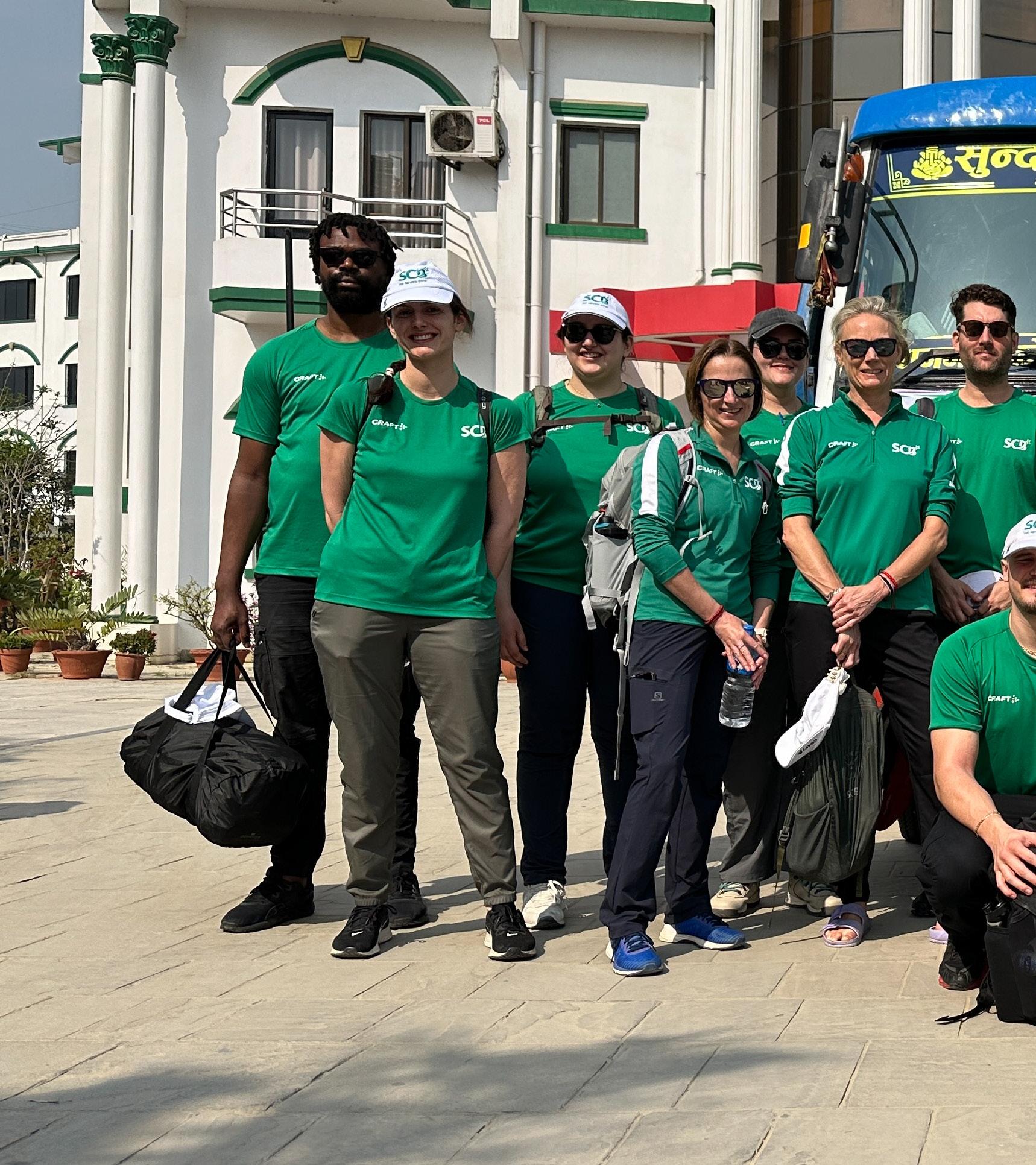


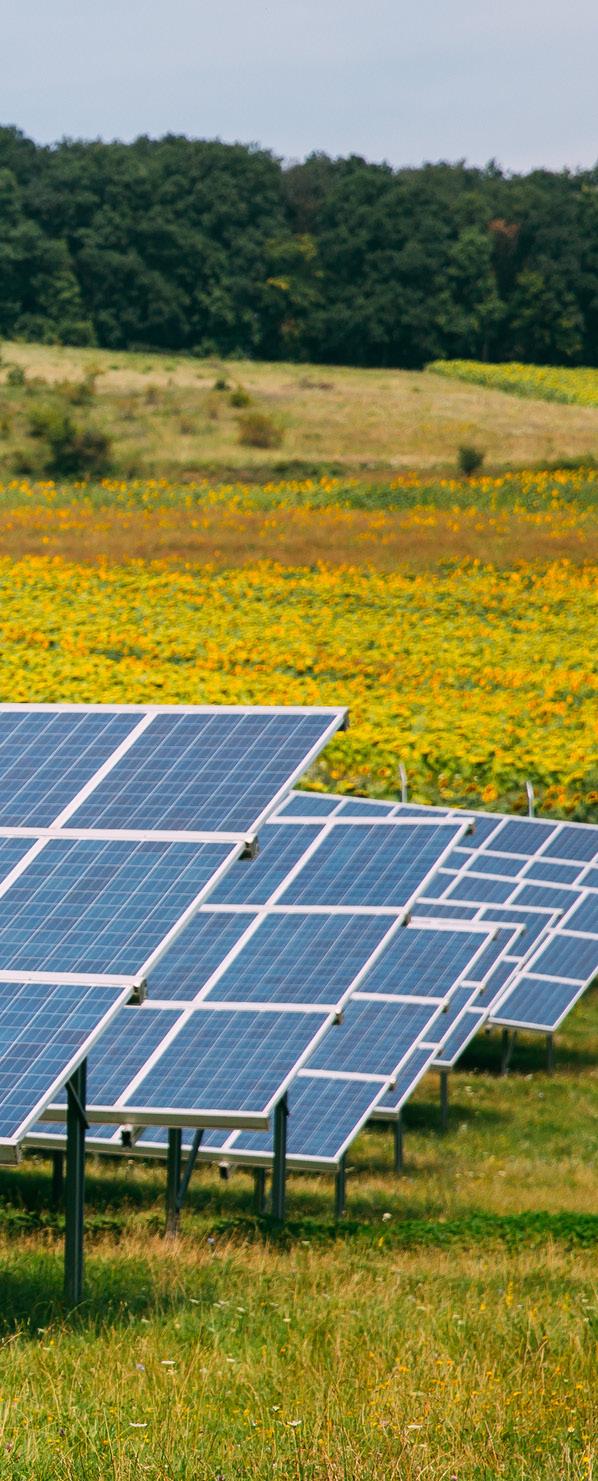

when it comes to sustainability,” she says. “So, our first step is always to understand where they are. Then we evaluate existing initiatives, identify gaps, collect baseline emissions data, and align decarbonisation plans with their strategic goals.” SCB also benchmarks performance against peers, helping clients position themselves competitively while staying compliant with ever-changing regulations.
It’s clear that Castelnuovo views sustainability not just as a risk-mitigation exercise but as a commercial opportunity. “Sustainability can absolutely go handin-hand with commercial performance,” she insists. “We’ve seen clients achieve significant emissions reductions—45% in one case—while continuing to grow their business.” Other examples include improved energy efficiency, extended equipment lifespans, and IT system optimisation. “These aren’t just good for the planet,” she adds. “They’re also financially smart, quick to implement, and offer wins for both sustainability and finance teams.”
Measuring impact remains a cornerstone of SCB’s approach. Beyond obvious metrics like emissions and energy use, the firm also tracks indicators such as improved RFP performance, revenue influence, and growing demand for ESGrelated data. Castelnuovo acknowledges that some of these are harder to quantify but believes they’re vital to capturing the full picture of an organisation’s sustainability journey.
Partnerships have played a significant role in SCB’s ability to deliver on these ambitions. One such relationship is with Nagarro, a technology partner that has been instrumental in building CarbonAI. “They’ve brought in technical expertise, natural language processing, systems integration… but more importantly, they share our values,” Castelnuovo says. “It doesn’t feel like a vendor relationship—it’s like they’re part of our team.”
The future, Castelnuovo believes, belongs to those who can combine innovation with integrity. AI, she says, is not a silver


bullet, but a powerful enabler—particularly in an industry that must process vast quantities of messy, complex data to make sound environmental decisions. “Whether it’s predicting climate risks, tracking pollution in real time, or improving resource efficiency, AI can help us scale solutions faster than ever before.”
Castelnuovo sees a growing urgency among business leaders to act decisively, not reactively. “Sustainability transformation, powered by tools like CarbonAI, is really about future-proofing your business,” she explains. “Regulations are tightening, climate risks are becoming more expensive, and customers are increasingly choosing companies that choose to act. Innovation isn’t optional anymore—it’s the most practical way to stay competitive.”
For SCB, this means staying agile and internationally relevant by monitoring regulatory changes across all major markets. Internally, the firm draws on a blend of in-house knowledge and external partnerships to remain adaptable. CarbonAI itself is designed to be future-ready, capable of responding to shifts in reporting frameworks, policy developments, and market dynamics without needing to be rebuilt from scratch.
That flexibility is vital, especially given the diversity of industries SCB supports—from manufacturing to finance. While sectorspecific challenges exist, Castelnuovo points out that common frameworks like the Greenhouse Gas Protocol enable cross-sector consistency. CarbonAI’s dynamic, customisable architecture further allows the platform to adapt to various regulatory and operational contexts.
But SCB doesn’t just ‘talk the sustainability talk’—they walk it internally as well. As a certified B Corporation, the company has integrated transparency, accountability, and environmental responsibility into its very structure. All SCB offices are ISO 14001 certified, and the firm has been carbon neutral since 2021. Staff are required
to complete in-house environmental training, and diversity and inclusion are central to its culture—evident in initiatives such as the "She Can Be" network for women.
One of the more unique ways SCB connects its employees to its mission is through its long-standing partnership with the NGO buildOn. More than 60 employees have travelled to countries like Haiti, Malawi, Senegal and Nepal to build schools in underserved communities— many equipped with solar panels to serve as adult learning centres. Later this year, another group will head to Guatemala to construct new facilities and sanitation blocks. “It’s a powerful way for our people to see the impact they can have,” Castelnuovo says. “It makes the work real.”
In a world where corporate responsibility can often be reduced to surface-level initiatives, SCB stands out for its depth of commitment and clarity of purpose. With leaders like Castelnuovo at the helm—balancing strategy, technology and empathy—there’s little doubt the organisation will continue to shape what meaningful sustainability looks like for years to come.
www.starcb.com

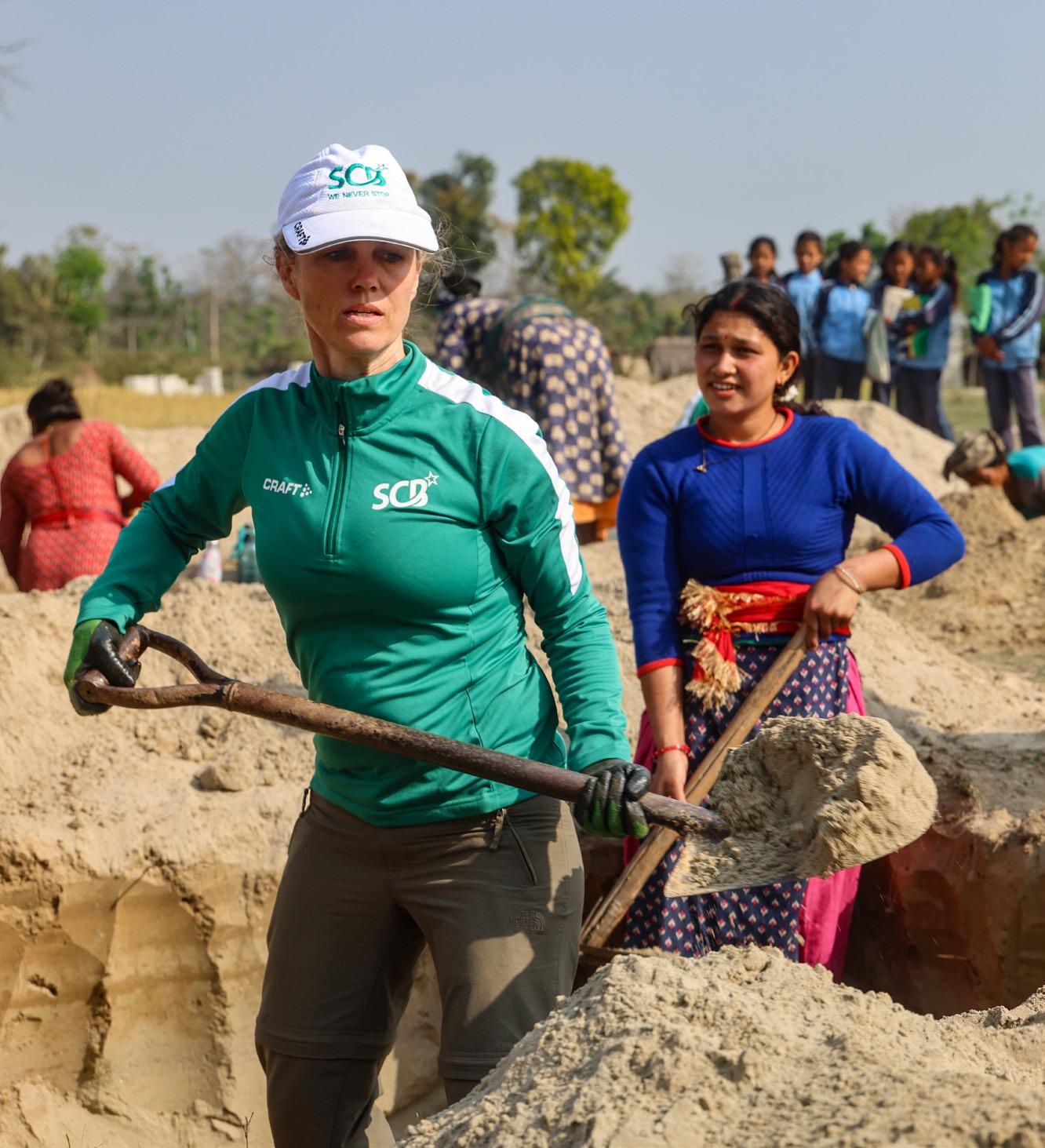
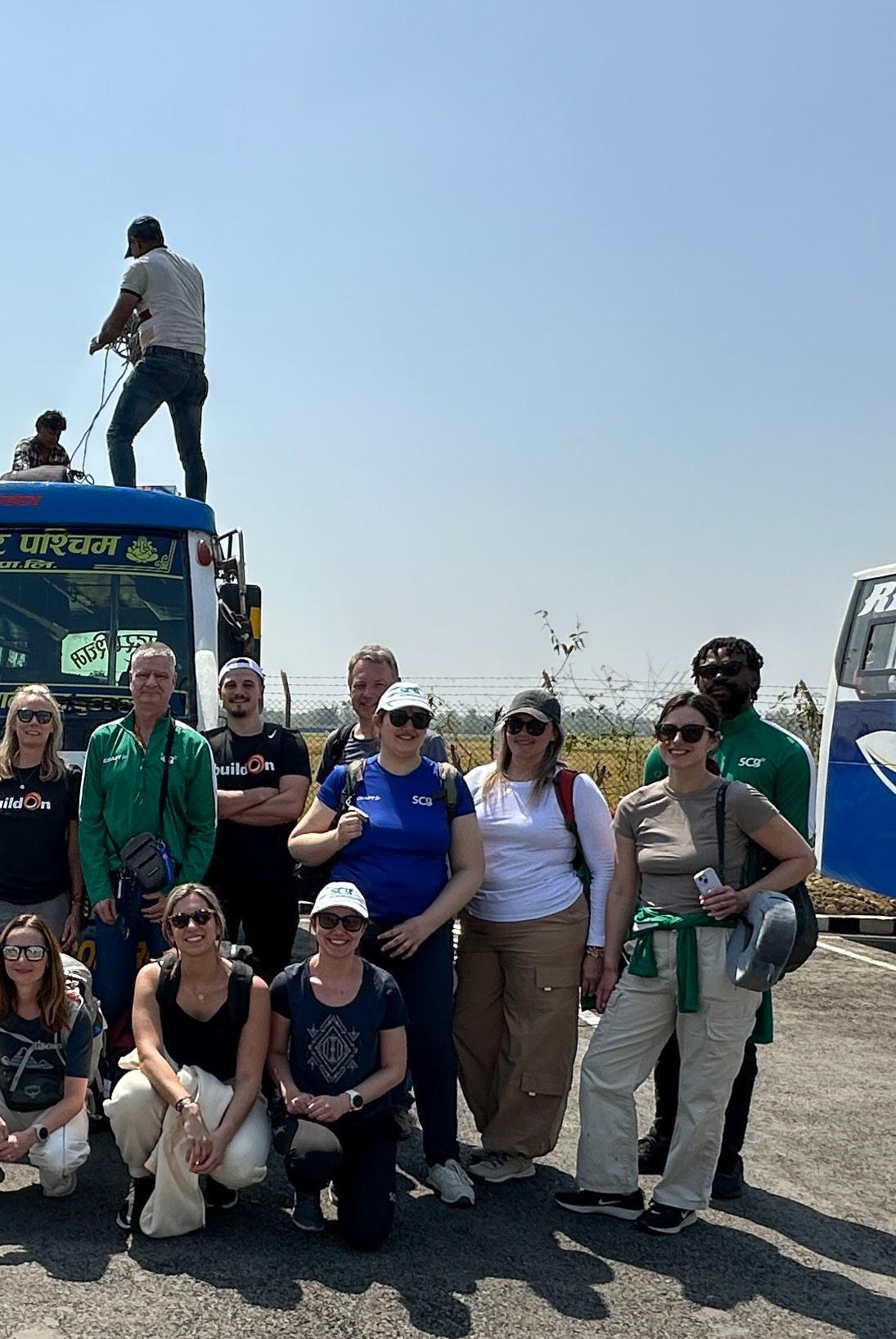

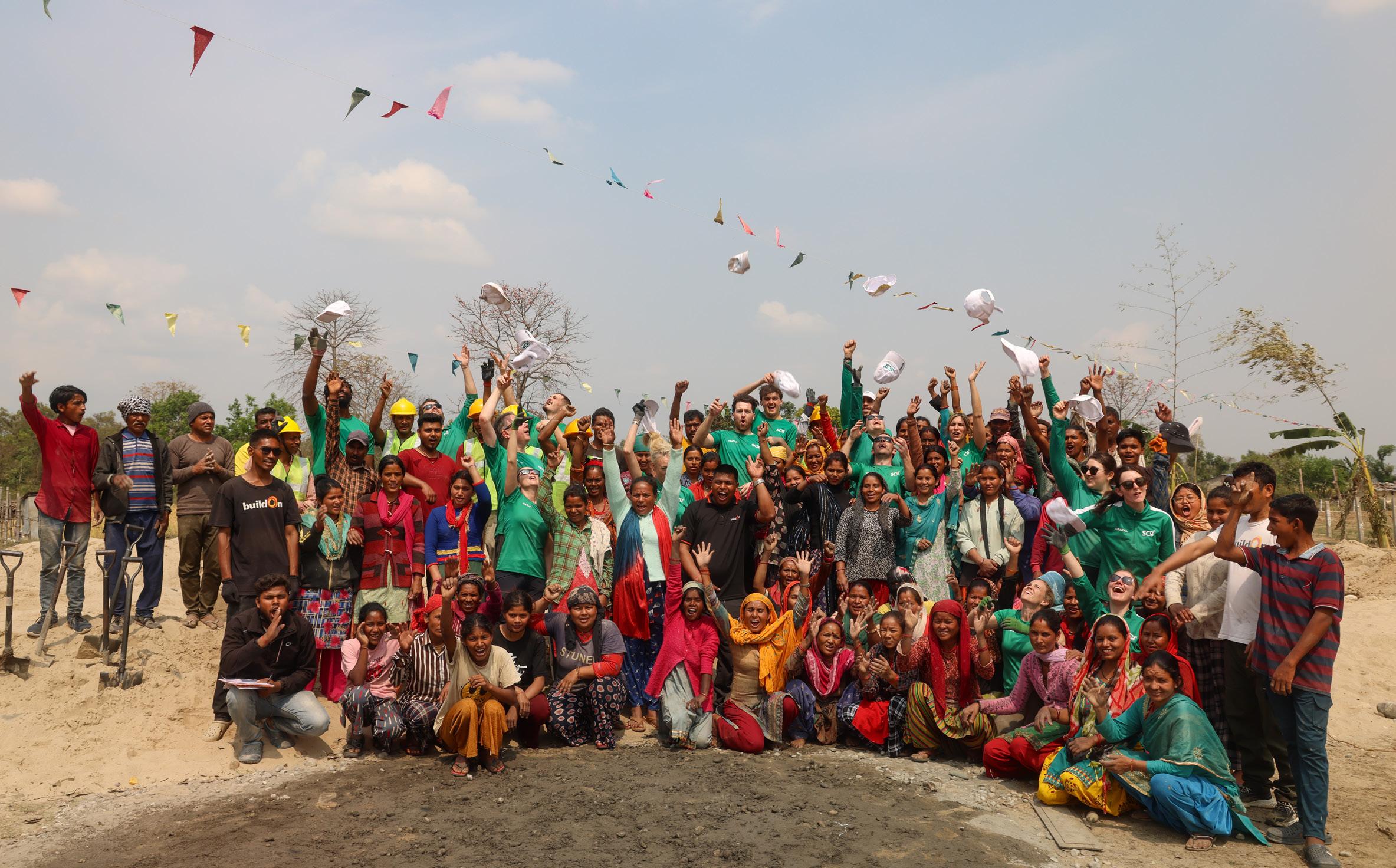
Tropical General Investments (TGI) Group is a name that continues to resonate across emerging markets for its long-standing record of delivering sustainable value, championing local development, and building consumer trust. Established in 1988, the group has grown into a multinational powerhouse, operating across Africa, the Middle East, Asia, and beyond. What began as a modest venture has since evolved into a diverse enterprise with stakes in fastmoving consumer goods, agriculture, chemicals, pharmaceuticals, and financial services.
At the heart of TGI’s success lies its ability to embed itself meaningfully in local economies. Rather than merely exporting a model from one market to another, the group has consistently tailored its operations to local cultures, supply chains, and consumer preferences. This localfirst ethos has enabled TGI to form deep connections with communities, while building robust, regionally respected brands. These include widely known names like Chi Limited, Chi Farms, WACOT, and Cormart—each contributing

to TGI’s reputation as a business committed not only to profit but to longterm, inclusive development.
One of the most significant success stories within TGI’s portfolio is Chi Limited, a leading producer of juice, dairy, and snack products in Nigeria. The brand's flagship offerings, including Chivita and Hollandia, have become household staples across the country. The company’s commitment to product quality, packaging innovation, and consumer engagement did not go unnoticed; in 2016, The Coca-Cola Company acquired a 40 percent stake in Chi Limited with an agreement to increase that to full ownership within three years. This partnership underscored the global appeal and business maturity of TGI’s consumer-facing brands. It was also a strong vote of confidence in the group’s ability to build market-ready businesses from the ground up.
TGI’s agricultural investments speak volumes about its belief in long-term, sustainable impact. With an eye toward food security and agrarian development, the group has invested in rice processing,

TROPICAL GENERAL INVESTMENTS GROUP PROJECT DIRECTED BY: JAMIE WAITE

C.G.Vink (MFR) Chairman, Tropical General Investments (TGI) Group

poultry production, and animal feed manufacturing. The group’s WACOT Rice Mill in Kebbi State, Nigeria, for example, is one of the largest in West Africa and directly supports local farmers through outgrower schemes, training, and infrastructure investment. TGI doesn’t simply operate within these communities—it enables them to thrive.
Execution of such ambitious projects requires strong, trusted partnerships— something TGI has cultivated with strategic collaborators like Vita Construction, one of the leading construction and civil engineering companies in Nigeria. Vita Construction has worked extensively with TGI across various infrastructure developments, ensuring that manufacturing facilities, food processing plants, and industrial complexes meet world-class standards.
From rice mills to pharmaceutical factories, Vita’s precise, quality-led construction has enabled TGI’s physical expansion across Nigeria and beyond. The relationship between the two organisations highlights TGI’s strategy of leveraging the best local expertise to realise complex development visions, further reinforcing its commitment to quality and economic localisation.
In parallel, the group has established itself as a key player in the pharmaceuticals and industrial chemicals sectors, providing essential inputs for local industries and supporting the health infrastructure of its operating regions. The presence of companies such as Cormart and CHI Pharmaceuticals under the TGI umbrella reflects a commitment to essential services and supply chains that are often overlooked by international investors.

These are not merely profitable ventures; they serve vital needs, from medical products to industrial solvents, adhesives, and water treatment chemicals.
What truly distinguishes TGI Group is its unwavering dedication to value addition. Unlike companies that rely heavily on imports and finished goods, TGI invests in local processing and manufacturing, allowing raw materials to be transformed domestically. This not only reduces reliance on global supply chains but also creates jobs, transfers skills, and supports domestic industries. It’s a strategy that is as economically prudent as it is socially responsible.
While the group’s scale and reach are impressive, it remains refreshingly grounded in its approach to business. Senior executives within TGI often speak
about the importance of integrity, cultural respect, and investing in people. These values are not mere words. They’re reflected in the group’s community development programmes, which span education, healthcare, youth empowerment, and environmental sustainability. From constructing classrooms to sponsoring medical outreach programmes, TGI has positioned itself as a partner in development rather than a distant operator.
This ethos is perhaps best illustrated by TGI’s Young Professionals Programme, an initiative that mentors and trains graduates across its businesses, providing a clear pathway to leadership within the group. At a time when many corporations are scaling back training investments, TGI’s approach ensures that the next generation of talent is nurtured from
within, creating loyalty and continuity across its global footprint.
Recognition for TGI’s contribution has come not just from commercial partners, but also from the public and private sectors. In recent years, the group has received accolades such as the Distinguished Economic Impact Award, a testament to its commitment to creating long-term economic value in underserved markets. However, the group’s executives are quick to downplay awards in favour of focusing on outcomes: increased local production, improved livelihoods, and resilient supply chains.
TGI has proven itself adept at navigating the complex business environments of the regions it serves. Whether facing currency volatility, infrastructure challenges, or evolving regulatory frameworks, the group has shown that flexibility and deep market understanding are key to resilience. The COVID-19 pandemic was a further test of
this strength, with TGI responding quickly to maintain food supply chains, support health initiatives, and pivot operations to safeguard workers and communities alike.
Looking ahead, the group continues to explore new areas of growth. Sustainability is increasingly becoming a cornerstone of its business strategy. From green manufacturing practices to responsible sourcing and waste reduction, TGI is investing in processes that reduce environmental impact without compromising operational excellence. The group has also embarked on digital transformation projects to improve efficiency, traceability, and customer engagement—reflecting a broader ambition to future-proof its operations in an increasingly connected world.
While TGI’s trajectory is one of expansion, it is doing so without losing sight of its founding principles. This combination of ethical ambition and commercial



For over 44 years, Vita Construction Ltd has been a trusted name in delivering world-class civil and building projects across Nigeria. From high-rise buildings and hospitals to industrial facilities and terminal ports, our expert team brings innovation, integrity, and precision to every project. We partner with clients, governments, and communities to create sustainable, inclusive, and high-performing environments—transforming the built world for a better tomorrow.
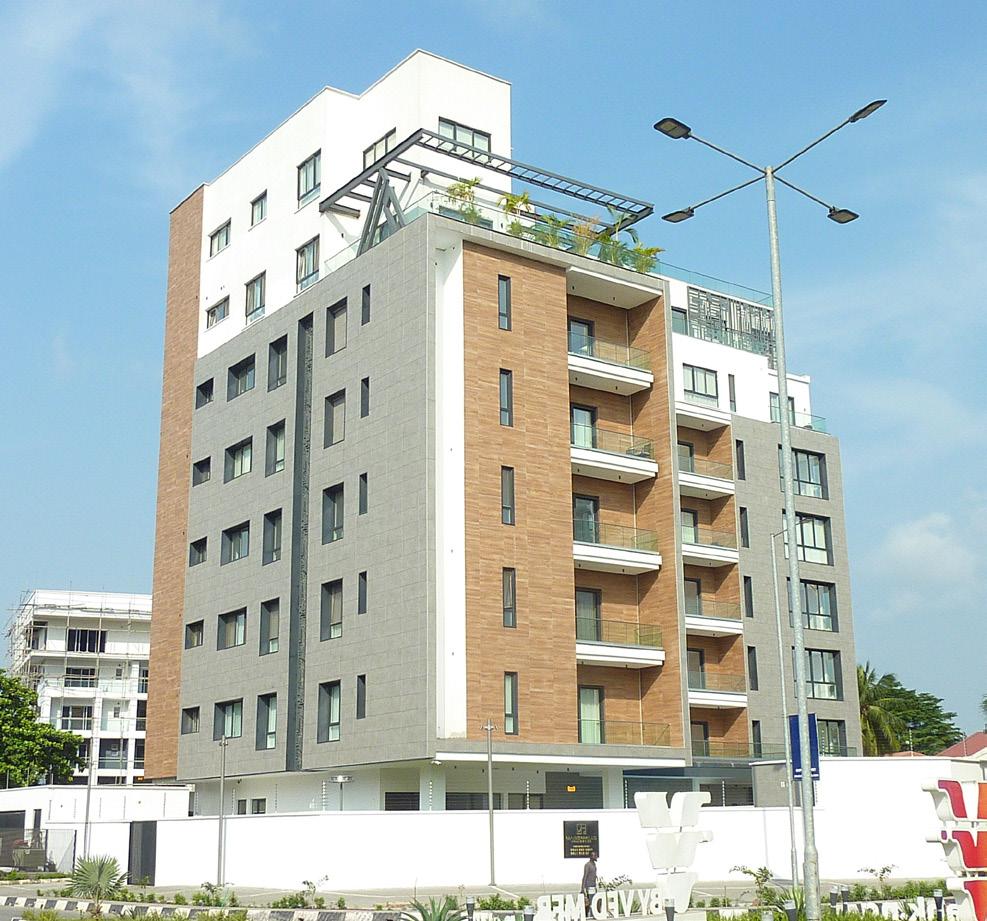

are
While
we
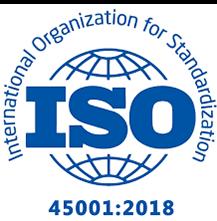




drive is relatively rare in the corporate world, especially at scale. TGI Group has proven that business success and social contribution are not mutually exclusive. In fact, for TGI, they are inseparable.
In an industry landscape often dominated by short-term wins and global consolidation, Tropical General Investments Group represents a different kind of success story—one that is grounded in patient capital, local insight, and long-term partnerships. As it enters its next phase of growth, the group shows no signs of slowing down. Rather, it continues to expand its influence across sectors and geographies, always guided by a belief in sustainable, inclusive development.
TGI’s enduring success is a result of strategic vision, deep community roots, and a refusal to take shortcuts. It is a blueprint that others might study, but few can replicate with the same level of authenticity and effectiveness. As Business Enquirer continues to follow the progress of this quietly powerful group, one thing is certain: TGI’s role in shaping tomorrow’s emerging economies is only just beginning.
www.clicktgi.net

MARENCO MARINE PROJECT
DIRECTED BY: ADEL MHIRI
Marenco Marine has been a leader in the Caribbean construction and piling sector for over 40 years. The company has established itself as a reliable partner for marine, piling, and foundation works, with a focus on innovation, sustainability, and strong relationships with local partners. As the company marks its 40th anniversary, it reflects on its journey, the challenges faced, and its vision for the future.
Founded by David and his brother, Marenco Marine is a family-run business that has spanned generations, with David’s two nephews now also involved in the company. This family foundation has been key to its success, fostering a deep sense of loyalty, integrity, and a long-term vision for the company’s future.
David reflects on the company’s beginnings, explaining that Marenco Marine started with a simple vision: to provide quality service in the construction
industry across the Caribbean. Today, this vision has expanded as Marenco Marine continues to deliver high-end projects across the region, with an emphasis on marine and piling services.
The company’s roots are firmly embedded in the Caribbean, with experience spanning multiple islands. “Each island has its own character and flavour,” says David, “and over the years, we’ve worked across several of them. Having local contacts on each island is critical when we need to mobilise quickly or work on a specific project.”
This local knowledge and expertise have allowed Marenco Marine to grow its business, but it’s not without its challenges. David acknowledges that in some areas, such as Barbados, there are complex dynamics between local labour and external contractors. He emphasises the importance of being diplomatic when operating in foreign territories.


Looking to fortify your next construction project with materials that stand the test of time? BRC West Indies Limited is your trusted partner for premium concrete reinforcement and structural solutions across the Caribbean. With over four decades of industry leadership since 1980, BRC has become synonymous with durability, innovation, and service excellence.
Headquartered in Cane Garden, St Thomas, Barbados, BRC offers a comprehensive range of products tailored to meet the demands of modern construction. From high yield rebar and welded wiremesh to custom cut and bent steeal and Brickforce, their reinforcement solutions are engineered to enhance structural integrity from foundation to finish.
But BRC's expertise doesn't stop at reinforcement. Their roofing systems, available in screw fixed and concealed fix profiles, offer both aesthetic appeal and resilience. Complementing these are hurricane rated Permashield shutters,
“We always try to hire as much local labour as we can,” David notes. “We find it essential to engage with the local workforce and provide them with opportunities. It’s about striking the right balance. You can’t just go into a foreign country with all your own people and equipment and expect to be welcomed with open arms. Diplomacy is key.”
Marenco Marine’s approach to overcoming challenges is rooted in a deep understanding of the islands where they operate. David explains, “Having established relationships with key partners has made execution easier. We know what to expect when we arrive at a job site.” These local relationships, built over years of working together, have been crucial for the smooth execution of projects.
David’s team includes a number of experienced managers and operators who are always available to be dispatched across the islands when needed. While they are not always on the payroll, these key players are contracted for specific jobs,
including accordion, Bahama, colonial, and roller styles, designed to protect properties from severe weather while enhancing curb appeal.
BRC also provides non structural mesh, Hercules fencing, seamless eave gutters, and hurricane straps, ensuring a holistic approach to building safety and performance. Their commitment to quality is backed by rigorous control standards and a reputation that spans the CARICOM region. Beyond products, BRC offers full service support, including island wide delivery, export logistics, and professional installation for roofing, gutters, and shutters. Their knowledgeable sales team is ready to provide free project quotations and technical advice to help you build smarter.
Discover why BRC West Indies is the Caribbean’s go to source for construction excellence. Visit brcwestindies.com or call +1 (246) 425 0371 to get started.
www.brcwestindies.com
ensuring the company has the expertise to tackle any project.
“There’s always a need to go down and put your head in the door and deal with small issues and big issues alike,” David remarks, highlighting the hands-on approach that has been integral to the company’s success. This approach allows the team to deal with any unforeseen complications swiftly, ensuring client satisfaction and ontime project delivery.
The company has also formed strong partnerships over the years with key local suppliers, contractors, and engineers. “We’ve worked a lot with CO Williams, a large earthmoving and road construction company. They often turn to us when marine work is involved,” says David. “We also have a solid working relationship with ReadyMix, our concrete supplier. This flexibility is crucial for ensuring that we can meet the demands of any project.”
David also stresses the importance of maintaining strong relationships with
View our interview with David E. S. Cooper, Director at Marenco Marine
Click the link below to watch.

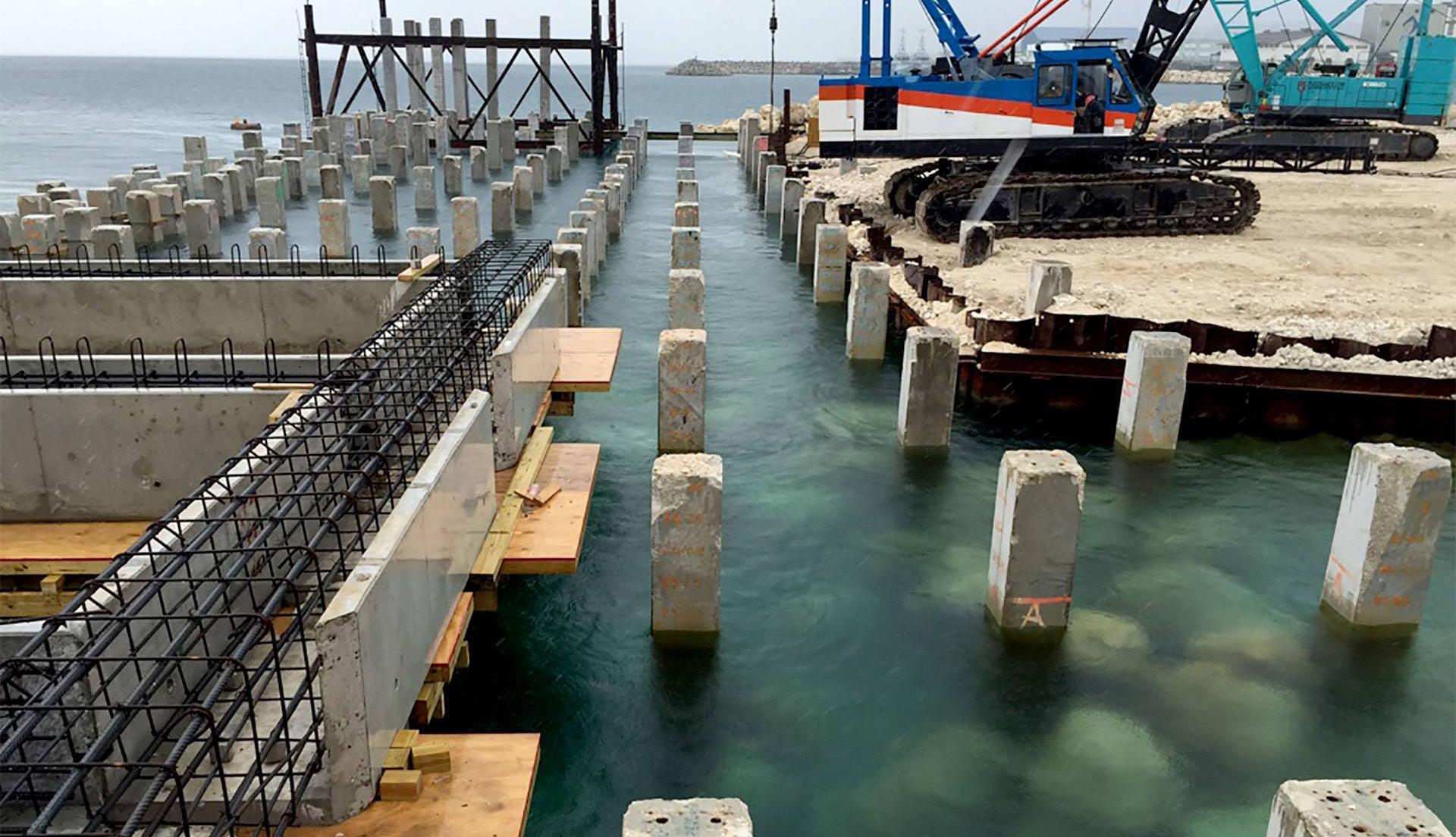
engineers who design the piles for the buildings. While the relationship with these engineers is vital, David does admit with a laugh that sometimes his team provides ideas to engineers, though they might not always get the credit. Nevertheless, this collaborative approach is key to ensuring that Marenco Marine delivers high-quality results on every project.
As Marenco Marine looks towards the future, the company has clear goals for the next decade. “Our priority going forward is to position ourselves as the premier piling contractor in Barbados,” says David. There are already several companies in Barbados working in similar fields, but David believes that Marenco Marine’s experience, equipment, and staff will enable it to rise above the competition.
One of the company’s primary goals for the future is to upgrade its equipment to ensure it can meet the demands of large-scale projects across the region. David explains, “In the past, when we’ve tried to take our CFA piling operations to other islands, we’ve struggled because we’ve had to rely on external suppliers, and they’ve sometimes let us down. That can really compromise a project. We want to be able to mobilise our equipment anywhere in the region, making us more efficient and self-sufficient.”
Another strategic priority is the expansion of the company’s marine work, particularly in light of the growing demand for larger yachts and luxury homes in the Caribbean. “There’s always more demand for jetties and other marine infrastructure,” David notes. “The yachts are getting bigger, and people are building more luxury homes. We want to ensure we’re positioned to capitalise on this growth.”
In addition to expanding its marine and piling capabilities, Marenco Marine is also considering diversifying into concrete supply and placement. “We’ve always focused on what we do best, but expanding into concrete supply is something we’re looking at,” David says. “This could be a natural extension of our
business, and we’re keen to explore the potential.”
As Marenco Marine grows, it is increasingly mindful of its environmental responsibilities. The company works closely with organisations such as the Coastal Zone Management Unit in Barbados to ensure that their operations are sustainable. David highlights the challenges faced on the west coast of Barbados, where development pressures are putting a strain on the natural environment.
“There’s a lot of pressure on the west coast, with more development and less beach access,” David notes. “It’s becoming harder for turtles to access the beaches, and the environmental impact of development is something we’re very concerned about.”
While Marenco Marine is committed to making a positive impact on the environment, David points out that solutions are not always straightforward. The company has been asked to carry out repairs on properties in the region, but David is clear about the importance of sustainable practices. “If you want to build something that preserves the coast, we’ll do it. If not, then we’re not interested,” he explains.
David believes that sustainable solutions— such as rebuilding jetties that once existed along the west coast—could help preserve the environment while benefiting the local economy. “We’ve been pushing for the restoration of these jetties, but it hasn’t come to fruition yet,” he says. “We hope that in the next five years, these plans will come to life.”
As Marenco Marine commemorates 40 years of success, David has a clear message for his clients, partners, and team members. “Marenco Marine is an established company with the experience and equipment to handle any project,” says David. “We’re not just focused on the past—we’re looking forward to the next 10 years and positioning ourselves to be the largest piling contractor in Barbados.”





David also acknowledges the company’s commitment to collaborating with local entities and playing a part in the development of Barbados as a premier destination for tourism and conferences. “We want to be a part of Barbados’ growth and help make the island a key player on the global stage,” he adds.
Ultimately, David’s message is simple but powerful: “We’re here to stay, and we’re always willing to adapt, grow, and contribute to the region's development.”
Marenco Marine’s 40-year milestone is a celebration of a family business that has withstood the test of time.
With a strong focus on relationships, sustainability, and quality, the company is well-positioned to lead the way in the Caribbean construction industry for many years to come. As they look ahead to the next decade, Marenco Marine remains committed to tackling the challenges of the region and contributing to the development of the Caribbean’s infrastructure and marine industries.
With a solid foundation and an experienced team, Marenco Marine is poised for continued success and growth, ensuring that it will remain a trusted name in the Caribbean construction industry for years to come.
www.marencomarine.com


Hadley Bourne, the Chief Executive Officer of Grantley Adams International Airport Inc. (GAIA Inc.), has spent nearly three decades in the aviation sector, building a wealth of experience that has proven invaluable in his current leadership role. For the past five years, he has steered GAIA Inc., one of the busiest airports in the Caribbean, through a period of continuous evolution and growth. His extensive career includes senior positions such as CEO of Argyll International Airport, Inc. in St. Vincent and the Grenadines, as well as roles within the Civil Aviation
Department of Barbados. In these positions, he honed his skills as both an air traffic controller and regulator, providing him with a unique blend of operational and strategic insight. This blend has allowed him to balance the day-to-day demands of running an airport while charting a clear path for its future growth and development.
Grantley Adams International Airport Inc., like many airports around the world, has faced numerous challenges in recent years. For decades, it has served as a critical hub for passengers

With over 70 years of experience in the aviation and culinary sectors, GCG has played a key role in supporting Barbados’ economic and tourism growth. As the country continues strengthening its position as a premier travel destination, ongoing investments in infrastructure, workforce development, and passenger experience remain critical. In close collaboration with Grantley Adams International Airport (GAIA), GCG is advancing initiatives to enhance operational efficiency, service quality, and local employment opportunities.
GCG recently announced an investment exceeding $4 million BBD in advanced ground support equipment (GSE), demonstrating its long-term vision for Barbados. This initiative elevates operational efficiency, workplace safety, and overall service quality at GAIA. As Barbados welcomes increased airlift and rising passenger volumes, GCG’s commitment ensures that the aviation sector remains well-equipped to meet growing demands.
This investment represents GCG’s pledge to support Barbados’ economic resilience. By expanding its workforce and implementing cross-training programs, the company has helped cultivate a new generation of aviation professionals, increasing the number of skilled local workers compared to previous years.
Strengthening its Airport Dining business line, which focuses on delivering curated culinary experiences in airports, GCG recently introduced URGE, a fast-casual dining concept offering premium burgers, hot dogs, sandwiches, and crispy tenders. Additionally, the launch of Bistro Market, a fresh, high-quality grab-and-go concept, marks another step in expanding dining options at GAIA, with more offerings to come.
In collaboration with GAIA and key tourism stakeholders, GCG enhances the airport dining experience, ensuring a welcoming and enjoyable journey for all passengers passing through Barbados.
The company’s influence extends beyond business; it plays an active role in shaping the future of Barbados’ tourism and aviation landscape. The company has engaged in discussions with the Ministry of Tourism and other key stakeholders to enhance critical aspects of the passenger journey, such as baggage delivery times and airport service improvements. These efforts align with GCG’s overarching purpose: to positively impact people’s lives through excellence, innovation, and personalized service.
“GCG’s commitment to Barbados is unwavering,” said Paulo Teixeira, CEO at GCG “By working closely with GAIA, government leaders, and industry stakeholders, we are strengthening infrastructure, developing local talent, and ensuring an enhanced experience for travelers. Barbados continues to grow as a leading regional hub, and we are proud to support this progress.”
As GCG strengthens its presence across The Caribbean and Latin America, its investment in Barbados highlights a broader commitment to sustainable development, job creation, and industry growth. Beyond providing services, it actively supports local economies and workforce development. Through continued investment and collaboration, GCG remains dedicated to driving long-term value and fostering sustained progress in the regions it serves.

www.gcggroup.com

With over 70 years of experience, we deliver world-class solutions across 30 international airports in 21 countries. Our 5,500+ skilled team members specialize in Sky Dining, Airport Dining, Aviation Support, and Culinary Solutions, ensuring top-quality service. Committed to workforce development and economic growth in Barbados, we recently invested $4 million BBD in ground support equipment to enhance efficiency and the passenger experience. We’re also redefining airport dining with URGE, our innovative fast-casual concept at GAIA.






Hadley Bourne, the Chief Executive Officer of Grantley Adams International Airport Inc.
travelling to and from Barbados, as well as a key cargo transit point for the Eastern Caribbean. The airport has seen steady growth since the early 2000s, but the scale of expansion required to meet the demands of a growing market has always been a delicate balancing act.
There have been no major expansion projects in recent years, but now, the airport is entering a new phase of development that promises to reshape its operations and infrastructure. As Bourne and his team prepare for this next phase, he is conscious of the need to ensure that growth does not come at the expense of efficiency. “The key is in planning and mitigating where necessary based on your requirements and scheduling,” he explains. “Communication and coordination with various stakeholders is critical, as is keeping passengers informed so they can manage expectations.”
The expansion of an airport is never a simple task. Airports are living ecosystems that require constant coordination across multiple facets of operations. From air traffic control to security, baggage handling, and passenger services, there is a delicate interplay of systems and processes that need to be integrated seamlessly to ensure smooth operations. This complexity is further compounded when it comes to expansion, as any construction or upgrade work can disrupt the flow of passengers and cargo.
However, Bourne’s approach to managing these challenges has proven effective. By focusing on careful planning, he and his team have been able to move forward with infrastructure projects while minimising disruptions to the daily flow of airport activity.
In the forthcoming financial year, GAIA Inc. will be embarking on a major infrastructure and development program geared towards the modernisation and expansion of the airport, which had previously struggled to keep pace with growing demand. Bourne highlights a key milestone in the airport’s development when the runway project was completed
The SRI Group LLC is a US Service-Disabled Veteran Owned Small Business that specializes in various aspects of security ranging from transportation security to border, immigration and physical security. We also provide solutions for intelligence issues as well as crisis incident management.
Our personnel have decades of experience ranging from regulatory to law enforcement to military and intelligence. We also focus and provide solutions for security technologies and strategies.
One of our main focuses is on aviation security and we have extensive security experience globally and have assisted multiple airports, airlines and governments providing solutions for simple to complex issues and problem








The Sol Group, a proud member of the Parkland family, is the leading supplier of energy solutions across 23 territories in the Caribbean, as well as Central and South America.
We serve a diverse range of commercial customers including those in aviation, trucking and fleet operations, as well as families and individuals who depend on a reliable partner to fuel their vehicles, homes and everyday lives.
At Sol, we are proud to be the trusted partner of choice for safe, reliable and timely fuel supply for travel across air and land.
Our strategically positioned hubs throughout the region ensure seamless access to premium aviation fuels: Jet A-1 and Avgas. Through partnerships with airports across our network,
we play a vital role in connecting the Caribbean by air, supporting both general and commercial aviation. Our dedication to international safety standards and operational excellence ensures efficiency and reliability for all aviation customers.
For on-the-ground travelers, Sol provides highquality fuels at conveniently located service stations, making refueling easy and accessible. Our well-stocked convenience stores offer a wide range of snacks and essentials, enhancing the travel experience for customers on the go.

Choose Sol as your reliable travel partnerensuring safety, quality, and efficiency at every step of your journey.
Visit solpetroleum.com to learn more.
Founded on September 1, 1970, Caribbean International Airways Ltd. (CIAL) was established to elevate the Barbados tourist industry and provide affordable travel for Barbadians living in the United Kingdom. With its first flight in December 1970, connecting Barbados to London and Luxembourg, the airline quickly became an essential link between the Caribbean and Europe.
By 1987, as its initial objectives were met and government funding for losses ceased, CIAL shifted its focus. It transitioned from airline operations to provide other vital services at the
Grantley Adams International Airport. Among its new ventures, CIAL managed the establishment of Club Caribbean Lounge and the In-Bound Duty Free Shop, which later became The Arrivals Duty Free Shop. Subsequently, CIAL entered into a Joint venture Partnership with Arienta Duty Free Group of Ireland, disposed of the In-Bound Duty Free Shop and partnered in forming a new entity called Caribbean Ari, trading under the Runway Brand at Grantley Adams International Airport, featuring a number of Duty Free Shops in the Outbound Terminal.

For over 30 years, the CIAL Meet & Greet service has been dedicated to providing top-tier VIP airport assistance, ensuring a seamless travel experience for their valued clients.
Whether you're arriving or departing from Barbados, CIAL Meet & Greet is there to help you skip the hassle and make the most of your time on the island, allowing you to experience the warmth and charm of Barbados without waiting in long lines.
Arrivals - Inside the arrivals hall, the CIAL team greets clients with a personalized meetand-greet service. Depratures - A CIAL agent meets clients curbside at the airport.
CIAL agents assist clients with prompt check-in and ensure access to the Airport lounge, if it is included in the service. This provides the comfort and convenience of a VIP experience.
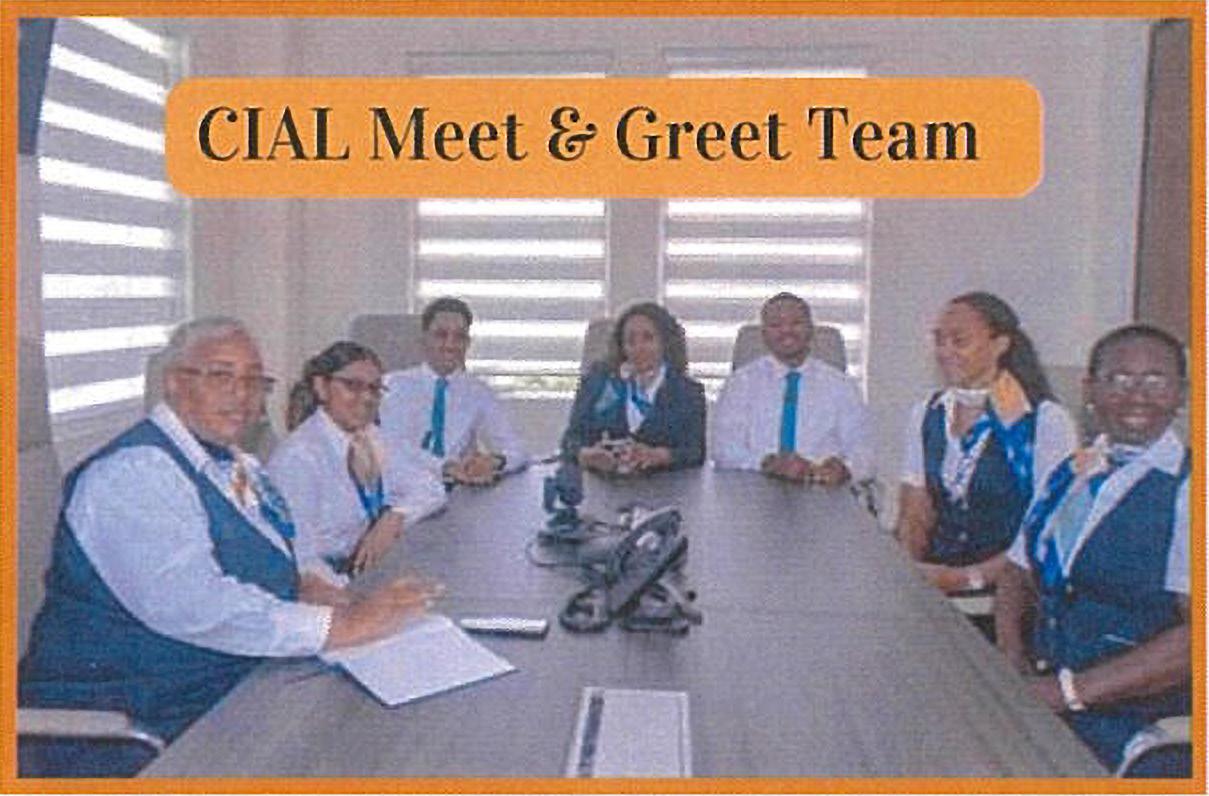
CIAL ensures proactive monitoring of flight schedules and offers assistance with rebooking canceled flights, ensuring peace of mind throughout your travel experience.
Whether it's a personalized name sign or tailored travel services, CIAL meets every client's unique needs to guarantee the highest level of satisfaction.
in 2021, having been initiated during the COVID-19 pandemic. The investment in the runway repositioned the airport’s capability to handle Code F and increased traffic volumes, which has been crucial as the region has seen a rebound in travel post-pandemic. Alongside the runway revitalisation, other improvements have been made to modernise the airport’s commercial activities, positioning GAIA Inc. for the future.
The government of Barbados, as the primary shareholder in the airport, has continued to support the expansion efforts. This strategic approach has been vital in ensuring that the airport can keep up with both current and future demand. Looking ahead, the focus remains on expanding the airport’s capacity while also enhancing the passenger experience.
GAIA Inc.’s plans for development in the coming years will see further upgrades to both the terminal and cargo facilities, with work already underway on finalising designs with contractors and architects. According to Bourne, the airport is preparing for a rapid construction phase towards the end of the year, which will involve a flurry of activity aimed at preparing the airport for the demands of the next decade.
While expanding the airport’s infrastructure is a priority, Bourne’s team is also focused on improving the overall passenger experience. A major part of this effort involves easing congestion during peak travel times. During certain periods of the day, particularly between 1 pm and 4 pm, GAIA Inc. can become overwhelmed with passenger traffic, with up to 90 percent of the day’s total passengers passing through during these hours. To address this issue, the airport has taken several measures to reduce pressure on its terminals, including the opening of the Concorde facility, a new annex terminal for charter flights. By moving up to 1,500 passengers from the main terminal during peak times, the Concorde facility has helped alleviate the congestion that has long been a challenge for GAIA Inc.
In addition to this, the airport is placing greater emphasis on the expansion of its cargo capabilities. Barbados’ location in the Eastern Caribbean makes it a critical point of transit for cargo, particularly for goods moving between Africa, Central America, South America, and other Caribbean islands. With the growing demand for air freight, modernising the airport’s cargo infrastructure is an essential part of the airport’s long-term development strategy. This is especially important as GAIA Inc. seeks to accommodate increasing demand for goods being shipped to and from the region, as well as to expand its reach to other international markets. While infrastructure improvements remain a critical focus, Bourne is also mindful of GAIA Inc.’s broader role in regional economic development. As the major airport in Barbados, GAIA Inc. is often the first point of contact for visitors to the island. It serves as an entry point for passengers travelling to and from the smaller Caribbean islands, such as St. Lucia, Grenada, and St. Vincent, who often rely on Barbados as a hub for international travel. With other regional airports also expanding their capacity, it is important for GAIA Inc. to maintain its competitive edge. However, Bourne is quick to point out that it is not merely about competing with other airports. “It’s not how we become competitive, it’s how the country remains competitive,” he says. “People don’t come to Barbados because of the airport. They come for the experience the country offers. The airport is just a vessel for that experience.”
With this philosophy in mind, GAIA Inc. works closely with the Barbados Tourism Marketing Inc. (BTMI) to ensure that the island’s image as a premier tourist destination remains strong. In recent years, the U.S. has emerged as a major source of visitors, making up a significant proportion of passenger traffic. This shift in the tourism market, combined with the return of regional airlift after the COVID-19 pandemic, has been a major driver of growth for the airport. The increasing availability of direct flights to destinations such as Panama, Suriname,

Steinbok Management Services Inc. offers a personalized approach to construction project management, ensuring each client receives tailored solutions that align with their unique vision. While our primary area of expertise is luxury residential, we have successfully managed a diverse range of top-tier projects, including supermarkets, healthcare facilities, and commercial retail spaces Regardless of scope or complexity, we uphold the highest standards of quality and precision.
Founded in 2014 by Mr Joseph Steinbok, our Managing Director, the company was built on a commitment to excellence in construction project management. With over 30 years of hands-on experience in the construction industry, Mr. Steinbok and his team bring extensive expertise in building procedures, regulatory compliance, contractor coordination, and quality control. This depth of knowledge allows us to anticipate potential challenges and implement proactive solutions that keep projects on schedule, within budget, and in line with the highest industry standards.
Our client-centric philosophy emphasizes transparency, collaboration, and meticulous oversight. We take a hands-on approach, remaining fully engaged throughout the process to address concerns swiftly, minimize disruptions, and ensure seamless execution.
With a reputation for excellence, reliability, and results we take pride in transforming concepts into reality. Whether managing a high-end residential project or overseeing a largescale commercial project, we remain committed to delivering exceptional results through meticulous planning, thorough execution and unwavering attention to detail.
Warrens Industrial Estate
Warrens, St. Michael.
Tel: (246) 228 9952
Fax: (246) 228 9956
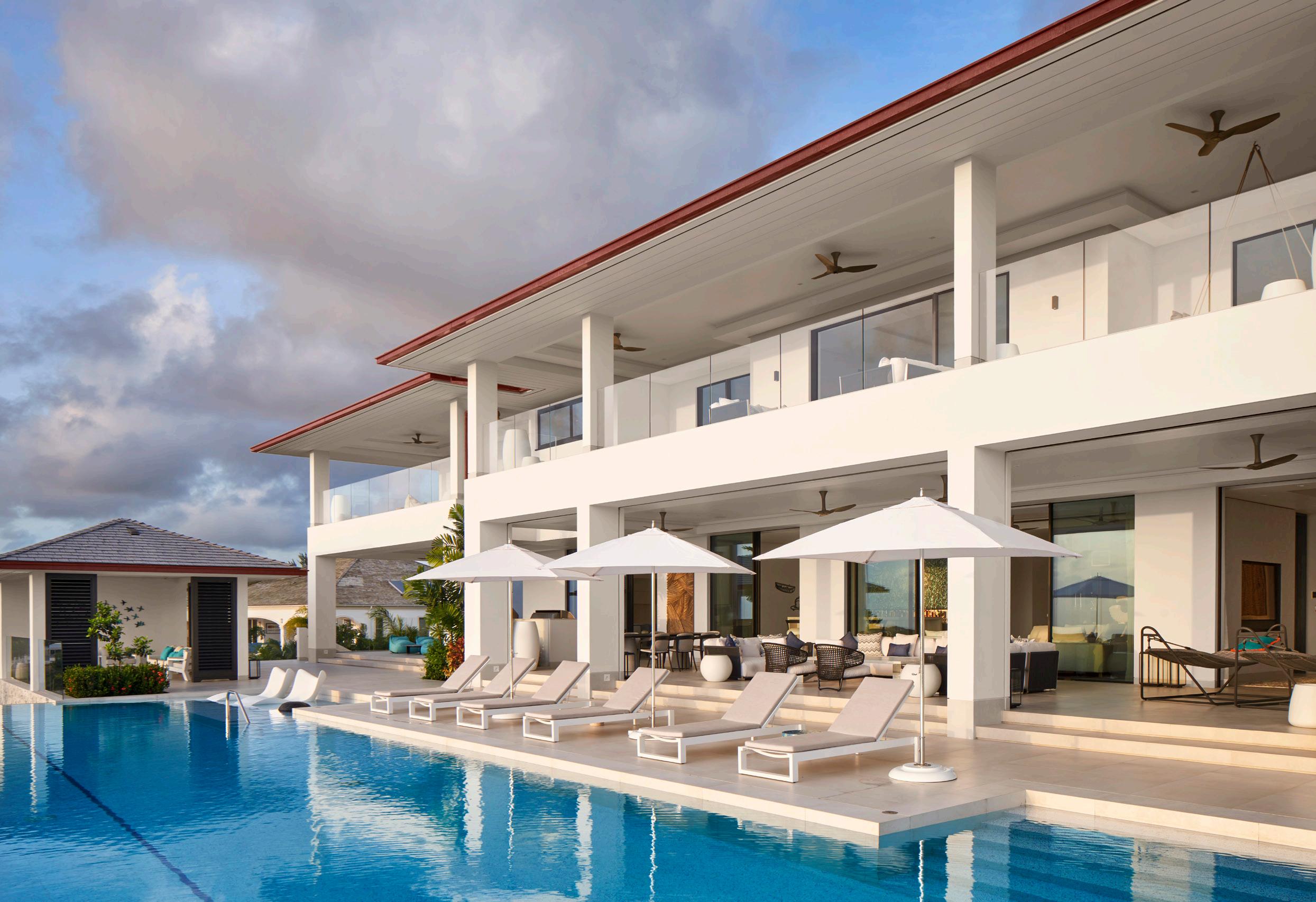


and Venezuela has also helped to expand GAIA Inc.’s network, ensuring that the airport remains a key player in regional and international aviation.
As GAIA Inc. continues to grow, it must also contend with the increasing global emphasis on sustainability. The aviation industry, known for its high carbon emissions, is under increasing pressure to reduce its environmental impact. Bourne is committed to ensuring that GAIA Inc. remains at the forefront of sustainable practices in the airport sector. The airport has already rolled out several initiatives to reduce its carbon footprint and improve its overall environmental sustainability. For example, as part of the runway revitalisation project, all runway lighting has been converted to energyefficient LED lights. In addition, the airport is upgrading its waste incineration system to meet modern environmental standards and is also modernising its wastewater treatment facilities to ensure that it complies with the highest environmental standards.
Rainwater harvesting has also been
introduced as part of GAIA Inc.’s sustainability plan. As a small island nation, Barbados is highly sensitive to water scarcity, making it essential for the airport to reduce its reliance on traditional water sources. By harvesting rainwater, GAIA Inc. can reduce its environmental impact while ensuring that it meets the needs of its operations. These efforts align with the broader priorities of the Barbadian government, which has made climate action a central focus of its international policy. Bourne notes that, despite being a small island nation, Barbados is one of the countries most affected by climate change. “We’re a small island development state, but we’re the ones most affected by climate change,” he explains. “It’s important for us to take responsibility, even though we don’t contribute significantly to global emissions. The effects of climate change hit us hardest, so we have to lead by example.”
Looking to the future, Bourne’s vision for GAIA Inc. is one of continued modernisation and improved passenger
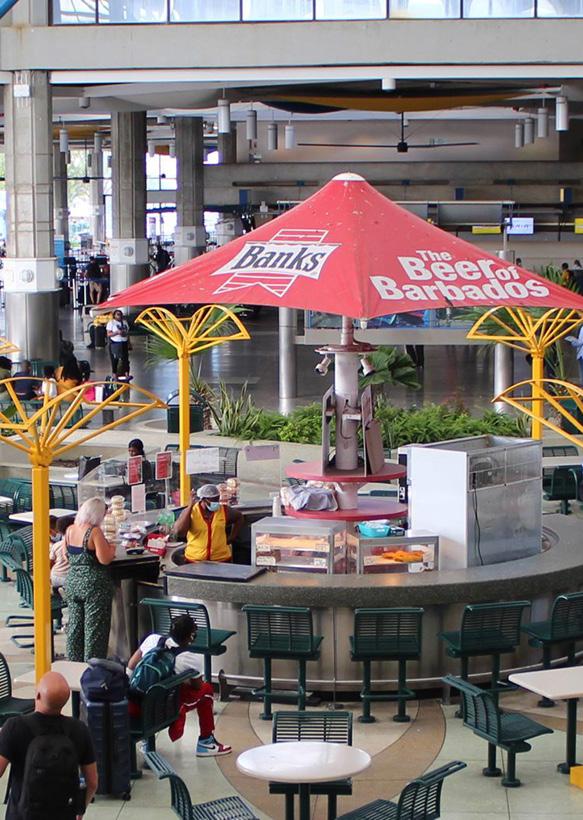

experience. As part of the airport’s development plan, significant upgrades are planned for its screening and baggage handling systems, which will enhance both security and operational efficiency. New technologies such as AIdriven facial recognition and electronic gates will also be introduced to streamline passenger processing and reduce waiting times. These upgrades are not only designed to meet current industry standards, but also to future-proof the airport for the next 10 to 15 years, ensuring that it remains a competitive and efficient hub in the global aviation network.
Bourne’s leadership has been integral in driving these developments forward, but he is quick to credit the team that supports him. “It takes a village,” he says, acknowledging the collaborative nature of the airport’s expansion. The airport has partnered with Jacobs International, a global leader in infrastructure
development, to help execute its expansion plans. Local contractors also play a vital role in the execution of these plans, providing crucial project management services to ensure that everything runs smoothly.
As GAIA Inc. prepares for its next phase of growth, Bourne remains optimistic about the future. The combination of strategic investment, sustainability initiatives, and technological advancements will ensure that the airport remains a key player in regional and international aviation. For Bourne, the focus remains on delivering an exceptional experience for passengers while keeping pace with the ever-changing demands of the aviation industry. The airport may be just a building, but for Barbados, it is a gateway to the world—and with a clear vision for the future, that gateway will continue to grow, adapt, and thrive for years to come.
www.gaia.bb

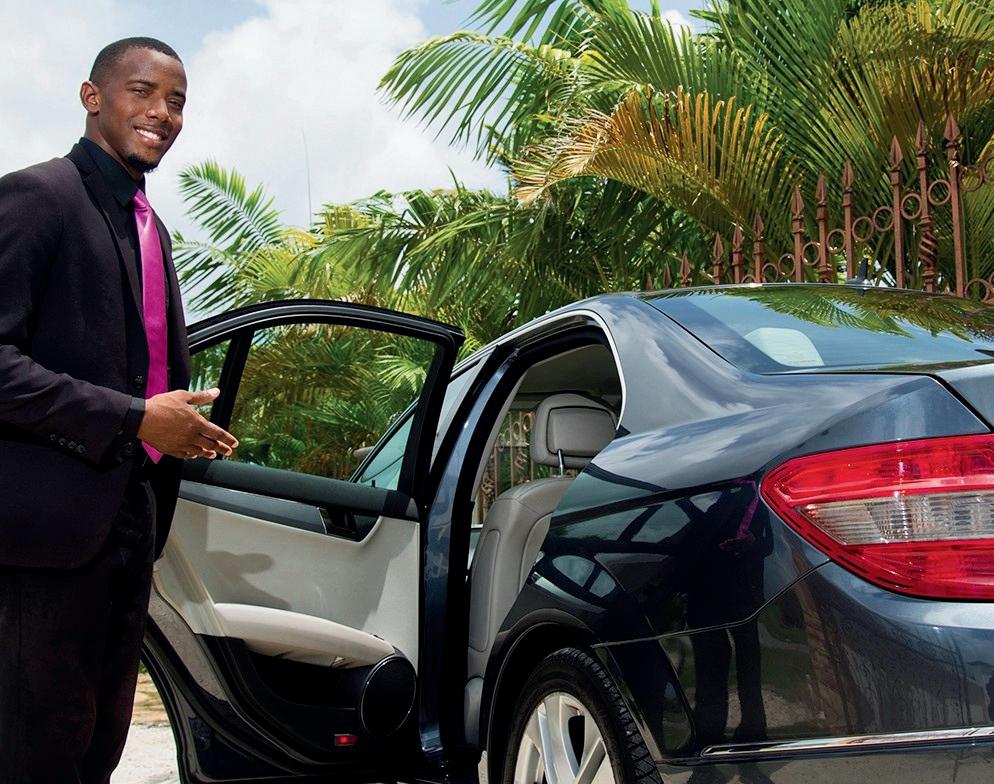
In the face of mounting environmental crises, few companies have demonstrated as much scientific resolve and strategic direction as Sulapac. Since launching in 2016, the Helsinkibased biomaterials company has established itself as a serious contender in the global shift towards sustainable, circular production systems. Today, in 2025, Sulapac’s role has matured beyond that of a disruptive start-up—it is now a trusted partner for international brands committed to eliminating plastic waste.
The scale of the problem Sulapac is tackling cannot be overstated. A decade ago, plastic pollution in oceans was estimated at five trillion particles. That figure has now exploded to around 170 trillion. The causes—poor waste management, inadequate recycling systems, and human negligence—have created what many researchers now refer to as a “plastic smog,” impacting everything from food chains and marine biodiversity to tourism and public health. If current trends continue, plastics in the ocean could outnumber fish by 2050.
Sulapac’s mission is to provide highperformance alternatives to conventional plastic that do not compromise aesthetics, functionality, or scalability. Its proprietary
materials are industrially compostable, biodegradable, and compatible with existing plastic manufacturing equipment—making them not only environmentally responsible but commercially viable at scale.
The core product range includes Sulapac® Universal, a fully bio-based and industrially compostable material suitable for rigid items such as cosmetic jars, product caps, and hangers. This solution offers high aesthetic value and strength, while degrading without leaving microplastic residues. The company has also developed Universal Flex 30, a versatile compound designed for single-use and reusable cutlery. Composed of 78% bio-based content, it delivers high durability, flexural strain, and is approved for food contact under both EU and FDA regulations.
Sulapac has also invested heavily in its Luxe and Luxe Flex material lines— engineered for premium packaging and luxury applications such as fragrance bottle caps and high-end containers. These materials offer excellent density, finish flexibility, and thermal resistance, serving as viable alternatives to hard plastics like ABS. Importantly, they are also fully recyclable and free of toxins or permanent microplastics.
SULAPAC PROJECT DIRECTED BY: JAMIE WAITE


Over the past five years, Sulapac has moved beyond materials development to become a strategic partner to some of the world’s most recognisable brands. A longstanding collaboration with French luxury house Chanel brought Sulapac into global focus, as the brand integrated Sulapac materials into its eco-designed No.1 de CHANEL product line. The partnership reinforced the feasibility of luxury brands transitioning towards sustainable materials without sacrificing the prestige or sensory experience expected by consumers.
Other collaborations have included Finnish design brand Marimekko and confectionery company Fazer, with whom Sulapac has developed compostable, food-safe packaging since 2018. These ongoing partnerships continue to drive material refinement and testing, expanding the range of use cases across sectors.
As of 2025, Sulapac has expanded its team in Helsinki to over 30 professionals across material science, production, quality assurance, and commercial strategy. This cross-functional capability is central to the company’s continued growth, allowing it to navigate regulatory requirements, innovate new material compounds, and support clients in market-specific rollouts.
The company’s current geographic focus includes Europe, the Middle East, and Japan, with North America forming a key target for expansion over the coming 18 to 24 months. Its growth strategy involves both direct sales and licensed production models to ensure regional accessibility and supply chain agility.
A key element of Sulapac’s outlook is the alignment of material innovation with global policy and waste infrastructure reform. Although its materials are designed to degrade safely in composting


Be different, think different for a sustainable future
environments, the company continues to advocate for stronger waste collection systems and clearer standards for compostability, recycling, and labelling. It also plays an active role in policy advisory and industry coalitions aimed at transforming waste management at a systemic level.
Sulapac is also investing in the future of biomaterial application, with ongoing research into 3D printing, thermoforming, and coatings that utilise its biodegradable technology. The adaptability of its materials means they could soon feature across a broader range of industries—from lifestyle and interiors to event services and point-of-sale displays.
From a commercial perspective, Sulapac’s strongest growth verticals remain in cosmetics, food service, and premium retail packaging. These sectors face growing consumer and regulatory pressure to replace single-use plastics with sustainable alternatives, creating long-term demand for Sulapac’s offerings. As global regulation around single-use plastics continues to tighten, particularly across the EU and OECD countries, Sulapac is well-positioned to offer turnkey solutions that align with environmental standards and performance expectations alike.
In its home country of Finland, Sulapac is also playing a leading role in promoting national innovation and bio-based leadership. It is part of a broader movement positioning Finland as a pioneer in circular economy practices and sustainable industrial design. The company supports Finland’s goals of becoming carbon neutral by 2035 and is seen as a flagship enterprise in the country’s sustainability portfolio.
Sulapac’s success story is defined not only by its material science but also by its values—placing environmental integrity, user experience, and industrial practicality at the centre of its product development. What began as a research-led mission to address plastic waste has evolved into a mature, commercially proven solution used by multinationals and SMEs alike.
With a robust intellectual property portfolio, a growing global client base, and a clear roadmap for scaling production and application, Sulapac is emerging as one of the most credible forces in the push towards a plastic-waste-free future. As consumer awareness grows and businesses race to align with sustainability targets, Sulapac offers an elegant, effective solution—designed for this moment and built for what comes next. www.sulapac.com
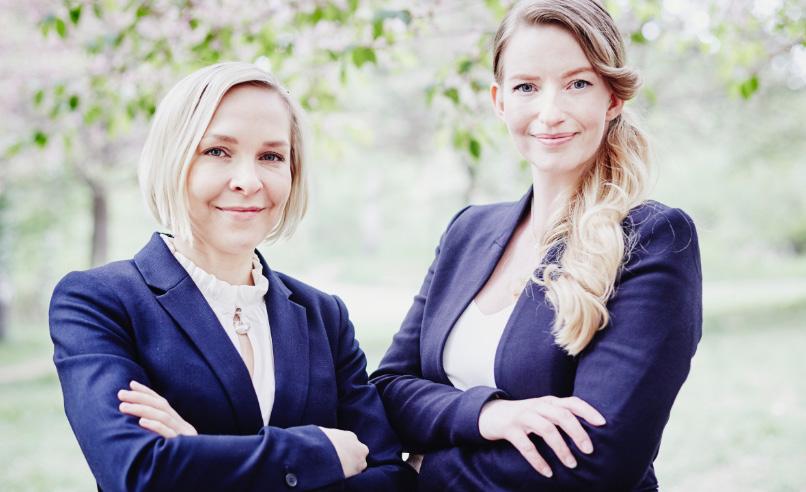


At Vita Construction Ltd, building strong client relationships has been the cornerstone of their success. In a recent interview with Business Enquirer, the team discussed the importance of long-term partnerships in the construction industry, with a particular focus on their enduring collaboration with TGI Group.
For Vita Construction, relationships like the one with TGI Group are vital. As explained, these partnerships are not just about delivering projects; they are about trust, mutual respect, and collaboration. "Long-standing client relationships are a reflection of the trust we’ve built over time," said Ben Kenneth, Planning Engineer at Vita Construction Ltd. "Our partners, like TGI Group, are not just clients; they become strategic allies."
These long-term relationships allow Vita to innovate continuously and play a meaningful role in the growth of their clients. It is this trust and mutual commitment to quality that drive their service offerings and ensure consistent, highquality outcomes.
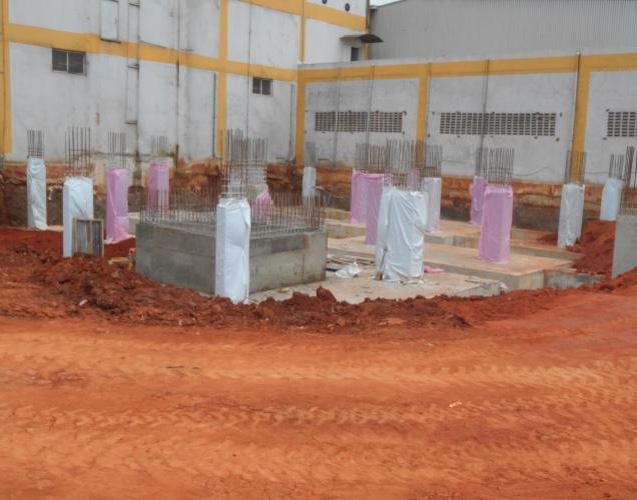
Vita Construction's partnership with TGI Group began in 2016, marking the start of a journey that would see numerous successful projects delivered on time and within budget. From the outset, the team was impressed by TGI Group’s corporate governance and vision for sustainable, long-term investments. TGI Group's structured and collaborative approach made them an ideal partner for Vita Construction, a company known for its attention to detail and high standards of quality.
One of the standout features of the partnership is TGI Group’s clarity of vision and commitment to transparency. "They always have a well-defined objective for each project, yet they are flexible and collaborative during execution," said Ben. This shared approach to project management and mutual respect has made the collaboration particularly effective.
Over the years, Vita Construction has successfully delivered numerous projects for TGI Group, further strengthening their bond. Some of the key projects include the PL kennel and cake storage warehouse for WOT Limited, a multi-seed oil mill for WOT Limited, and the tank farm foundations for West Africa Soya Industries Limited. More recently, they completed the meal factory expansion for Wacot Rice Limited in 2021, following their successful work on the Rise Plan in 2016.
These projects have consistently demonstrated Vita Construction’s ability to meet deadlines, adhere to budgets, and maintain the highest quality standards. These successful deliveries are the foundation of their longstanding partnership, contributing to the continued trust and collaboration between both companies.
TGI Group’s commitment to sustainability and innovation is one of the key factors that sets them apart from other clients, according to Vita. "Their willingness to invest in quality, sustainability, and innovation makes them a standout partner
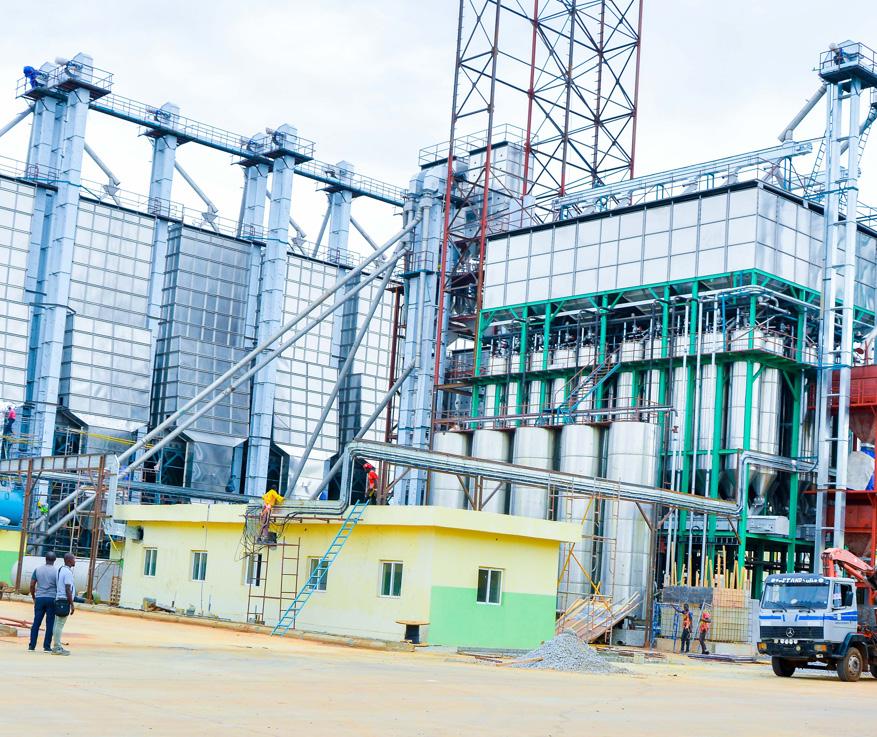
compared to many other clients," said Ben. This aligns perfectly with Vita Construction’s values and approach to business, as both companies are focused on creating value through sustainable practices.
As Vita Construction continues to grow and expand, they are committed to remaining adaptable to meet the evolving needs of their clients. Vita invests in new construction technologies and project management tools to ensure they can handle more complex, time-sensitive, and sustainable projects. They also emphasise early collaboration with their clients to ensure solutions evolve alongside changing needs.
Looking ahead, Vita Construction is excited about the future of its partnership with TGI Group. There are numerous opportunities for collaboration in sectors such as industrial
development, logistics, infrastructure, and sustainable building practices. By staying aligned with TGI’s vision, Vita Construction aims to continue contributing to impactful and innovative projects.
"Our goal is to be a proactive partner, not just a service provider," said Ben. With both companies expanding into new sectors and regions, the future looks bright for this enduring partnership, promising even more opportunities for innovation and growth.
Vita Construction’s relationship with TGI Group exemplifies the power of collaboration, shared values, and a commitment to excellence. As they continue to build on this foundation, there’s no doubt that they will remain leaders in the construction industry, setting new standards for quality, sustainability, and innovation.



APROJECT DIRECTED BY: GARY
SMITH
s global cities race toward sustainable, data-driven futures, the United Arab Emirates stands at the vanguard of urban innovation— and nowhere is this more evident than in its capital, Abu Dhabi. At the heart of the city’s transformation lies the Integrated Transport Centre (Abu Dhabi Mobility), an affiliate of the Department of Municipalities and Transport. Through pioneering technologies, ambitious infrastructure developments, and a forward-thinking vision, Abu Dhabi Mobility is redefining how residents and visitors move through the city.
From autonomous taxis to AI-optimised transport systems, Abu Dhabi Mobility is building a multimodal, efficient, and sustainable urban mobility ecosystem— poised not only to meet today’s challenges but also to lead the global smart mobility movement of tomorrow.
As Abu Dhabi’s skyline continues to evolve with rapid urban expansion, so too does its transport landscape. Abu Dhabi Mobility is spearheading a fundamental shift toward integrated, intelligent transport systems. Harnessing the power of big data, artificial intelligence, and the Internet of Things (IoT), the Centre is building a transport network that is smarter, safer, and more efficient.
Central to this transformation is the Smart Mobility Analytics Framework, known as Fusion, which facilitates real-time data analysis for optimised transport scheduling and congestion management. This cutting-edge platform enables planners to make evidence-based decisions, reacting to shifting commuter demands and road conditions as they happen.


Emirates Global Motor Electric, a member of Alfahim group, Is a dedicated company for Electrifying commercial vehicle fleets through a wide range of products including Battery Electric Trucks, Buses, vans, Hydrogen powered buses as well as multiple range of chargers and battery swapping stations.
Emirates Global Motor Electric (EGME), a part of the Al Fahim Group, is dedicated exclusively to electrifying commercial vehicles across the UAE. EGME offers endto-end solutions, including vehicle supply— available through purchase or leasing— Charging-as-a-Service (CaaS), conversions and body building, repair and maintenance contracts, and vehicle connectivity. By offering a comprehensive service, we aim to simplify the transition for our partners looking to integrate electric commercial vehicles (ECVs) into their fleets, starting with trials and demonstrations as a proof of concept.
Established in 2022, EGME has thoroughly tested its range of electric commercial vehicles under peak summer temperatures and in some of the UAE’s most demanding operational environments. This ensures our vehicles meet both customer expectations and the region’s unique environmental challenges.
A key milestone for EGME has been our partnership with the Integrated Transport
Centre (ITC), which began during COP28. As part of this collaboration, we introduced nine battery electric intercity buses manufactured by MCV operating between Abu Dhabi Airport and Expo City Dubai. These buses are now serving daily routes within Abu Dhabi, connecting key areas such as Al Rahba, Saadiyat Island, and the city center.
In addition, EGME delivered six green buses—three battery electric city buses manufactured by MCV and three hydrogen fuel cell manufactured by Wisdom motors (1 x city hydrogen bus, 1 x intercity hydrogen bus & 1 x double decker bus)—which operate up to 18 hours per day across Abu Dhabi, contributing to the city’s shift toward sustainable public transportation.
Looking ahead to 2025, EGME is focused on scaling up the deployment of electric commercial vehicles by expanding collaborations with existing and new partners. We are set to launch a new range of projects, vehicles, and services that will be announced soon—marking the next phase in driving sustainable transport across the UAE.

The introduction of autonomous mobility solutions—most notably the TXAI autonomous taxi service—is another milestone. These self-driving vehicles are already offering on-demand rides across select zones, embodying the city’s ambition to become a testbed for future transport technologies. Alongside TXAI, on-demand transport models offer residents flexible travel options, which reduce wait times and improve service efficiency.
But the innovation doesn’t stop there. Abu Dhabi Mobility is actively promoting multimodal integration—bringing together buses, taxis, micromobility services (such as e-scooters and bike sharing), and pedestrian infrastructure into a cohesive network. This approach enhances last-mile connectivity while encouraging residents to shift from private vehicles to more sustainable alternatives.
In a rapidly urbanising environment, emerging technologies are not simply beneficial—they are essential. Abu Dhabi Mobility’s integration of AI and IoT across its operations is enabling a level of predictive capability that would have been inconceivable just a decade ago.
AI-driven predictive analytics forecast commuter trends, optimise public transport routes, and mitigate congestion in real time. For example, smart traffic signals now dynamically adjust their timing based on actual traffic flows, improving road efficiency and significantly reducing emissions from idling vehicles.
IoT-enabled sensors, embedded throughout the transport infrastructure, feed data into centralised command and control centres—ensuring live monitoring of road usage, transit reliability, and even environmental impacts.
Real-time public transport tracking and digital route planning apps are making it easier for residents to navigate the city’s growing network. Whether commuting for work or exploring the capital’s cultural gems, travellers can access live updates and seamless journey planning tools with just a tap on their smartphones.
In alignment with the UAE’s Net Zero by 2050 strategic initiative, Abu Dhabi Mobility is placing sustainability at the core of its transport transformation. The Green Bus Programme is a flagship effort, replacing diesel-powered buses with electric and hydrogen alternatives. By


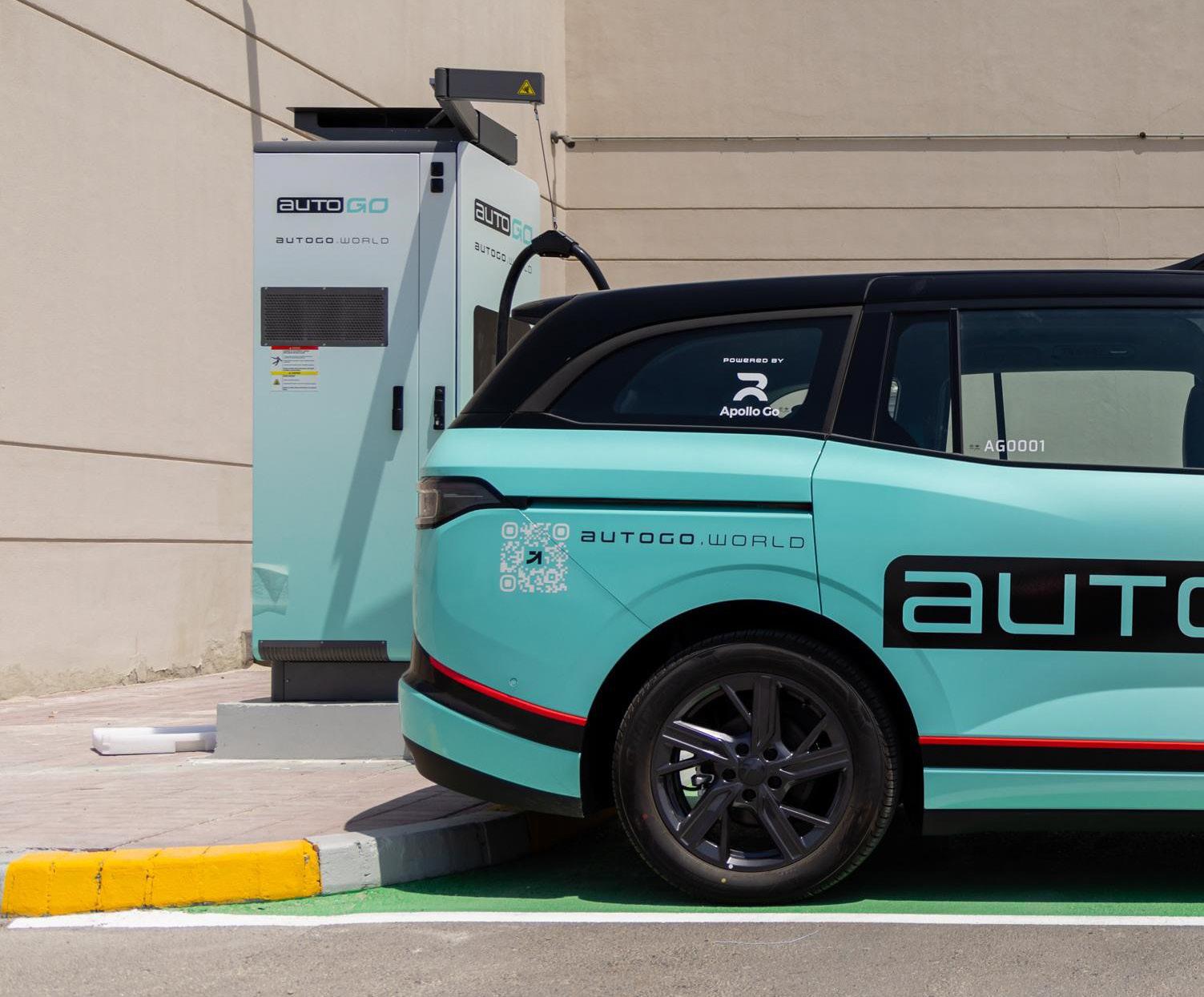
2030, Abu Dhabi Island is set to become a dedicated green public transport zone— serviced exclusively by zero-emission vehicles.
Electrification extends beyond public buses. Abu Dhabi Mobility is expanding its electric vehicle (EV) infrastructure across the city, forming partnerships with private sector stakeholders to accelerate EV adoption and shared mobility services. These developments aim to reduce the carbon footprint of urban travel while giving residents greener transport options.
Micromobility is another critical pillar in the sustainability framework. Dedicated cycling lanes, expanded pedestrian
pathways, and the promotion of e-bikes and scooters offer safe, efficient alternatives for short-distance travel. These options are particularly effective in bridging the “last-mile” gap, encouraging the use of public transport for longer journeys and active transport for the final stretch.
Public transport accessibility is key to any sustainable urban development plan. Abu Dhabi Mobility is addressing this need with both strategic infrastructure projects and user-focused services.

The AD Link On-Demand Bus Service is a shining example of how technology and user-centric design can transform public transport. Accessible via a dedicated app, the service allows residents to book rides in real time, ensuring that buses operate only when and where they are needed. This model not only reduces wait times but also enhances resource efficiency—making public transport more appealing and environmentally responsible.
Investments in micromobility infrastructure, such as dedicated lanes and new pedestrian bridges, are being rolled out alongside the expansion of traditional bus routes and service frequencies. These developments reflect Abu Dhabi Mobility’s
commitment to creating a multimodal transport network that integrates every aspect of urban mobility.
To meet the demands of a growing city, Abu Dhabi Mobility is forging partnerships and rolling out ambitious infrastructure projects that will shape the next decade of transport in the Emirate.
One notable achievement is the opening of the Al Aliah Ferry Terminal, which strengthens maritime connectivity between Abu Dhabi’s islands and the mainland. As part of a broader strategy
to diversify transport modes, further maritime routes are currently under review.
Other upcoming initiatives include:
Expansion of the Green Bus Network: More zero-emission vehicles will be deployed to support the 2030 green transport zone vision.
Development of Smart Mobility Hubs: In partnership with Masdar and other key players, these hubs will consolidate transport services—including EV charging, e-scooters, and on-demand buses—under one roof.
Micromobility and Active Transport
Investments: Ongoing expansion of cycle paths, pedestrian infrastructure, and micromobility networks to offer lowcarbon alternatives across the city.
Expanding Autonomous Vehicle Service to Include Access Roads to Zayed International Airport
The Integrated Transport Centre (Abu Dhabi Mobility) Organises the “No Distraction While Driving” Forum
These projects underscore Abu Dhabi Mobility’s holistic approach to urban mobility—prioritising sustainability, efficiency, and innovation at every stage of development.
Despite its remarkable progress, Abu Dhabi faces familiar urban transport challenges: traffic congestion, gaps in public transport coverage, and the behavioural shift required to move away from car dependency.
Abu Dhabi Mobility’s multi-pronged strategy addresses these issues head-on. Smart traffic management, enhanced service accessibility, and integration of real-time data analytics all play crucial roles in reducing congestion and improving journey times.

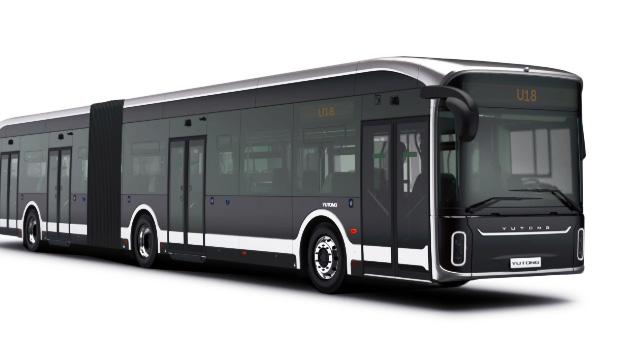

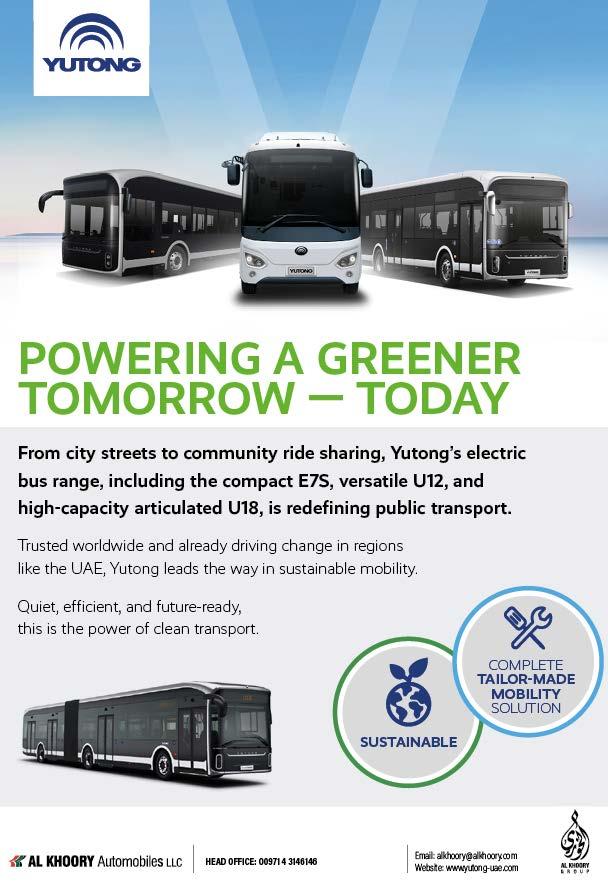
Meanwhile, increasing the reliability and coverage of public transport—through services like AD Link and expanded bus routes—is helping foster a cultural shift toward more sustainable transport habits.
To remain a global leader in transport innovation, Abu Dhabi Mobility keeps its finger firmly on the pulse of emerging mobility trends. From piloting autonomous vehicle programmes to collaborating with international innovators, the Centre is committed to testing, refining, and scaling new technologies.
Regulatory flexibility is a key enabler. Abu Dhabi Mobility works in tandem with government entities to ensure that evolving technologies—such as autonomous shuttles or AI fleet management—are seamlessly integrated into the existing system.
This agile approach to regulation and infrastructure ensures that the city’s transport ecosystem remains futureproof—capable of adapting to new mobility paradigms as they emerge.

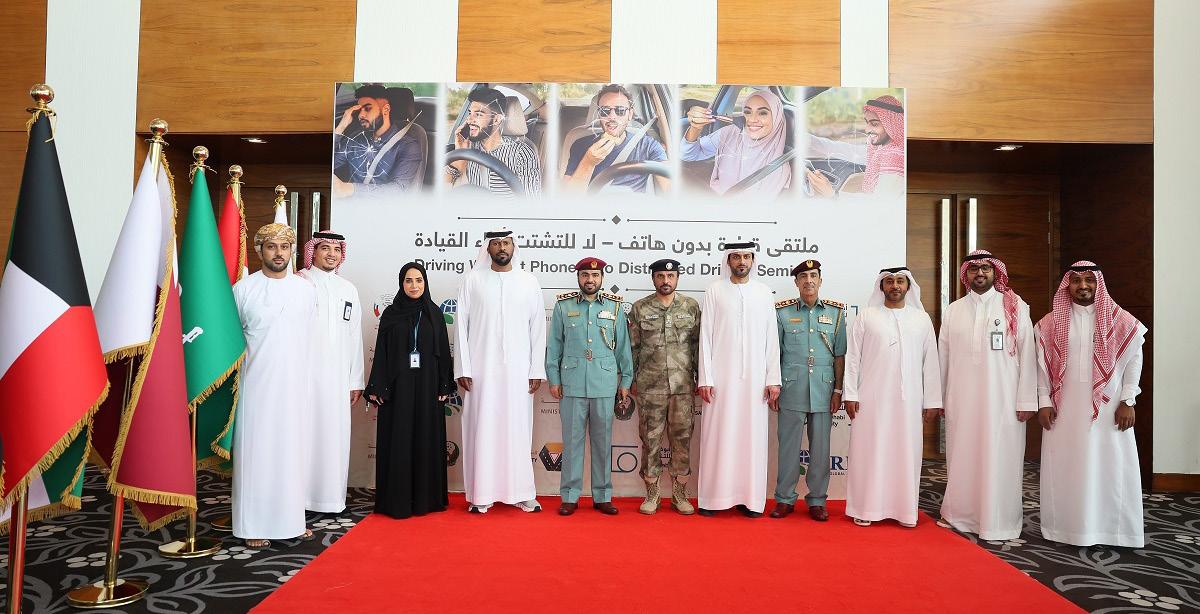
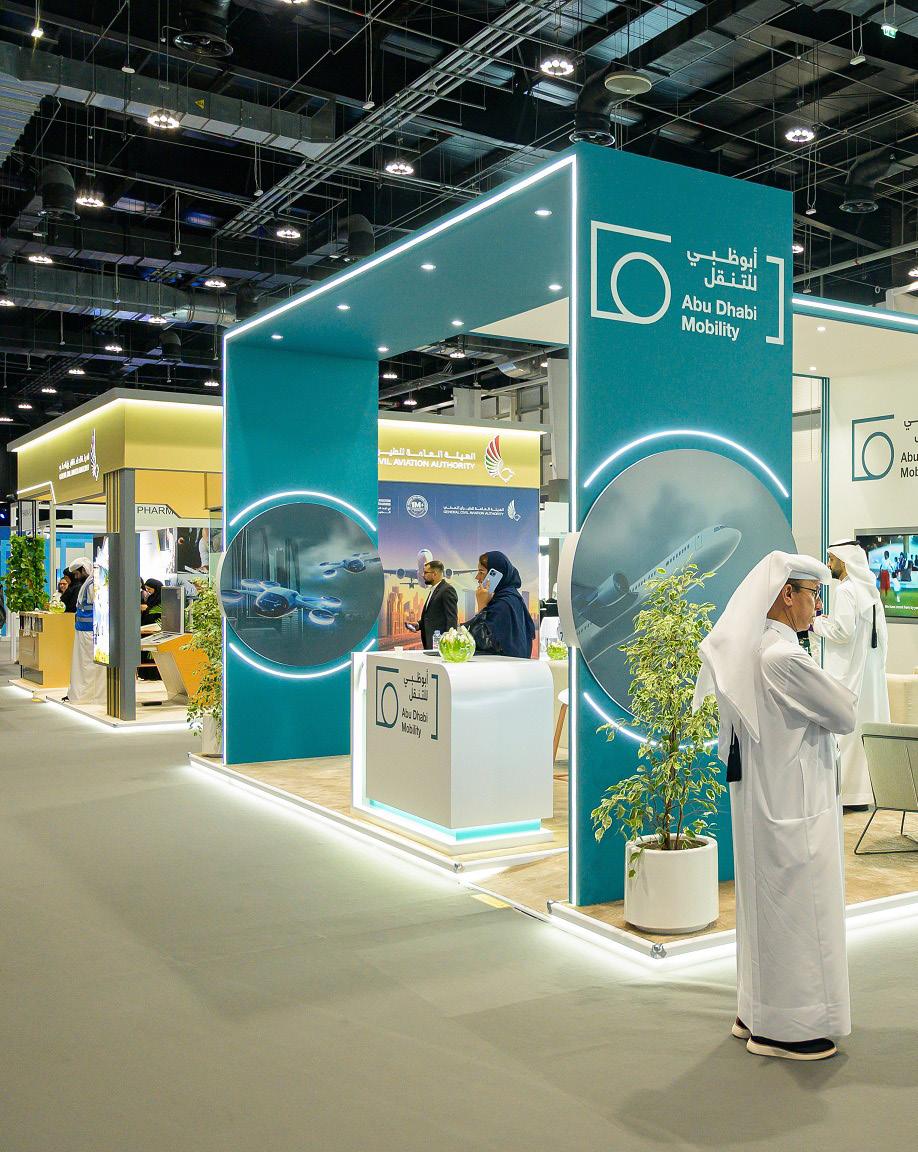
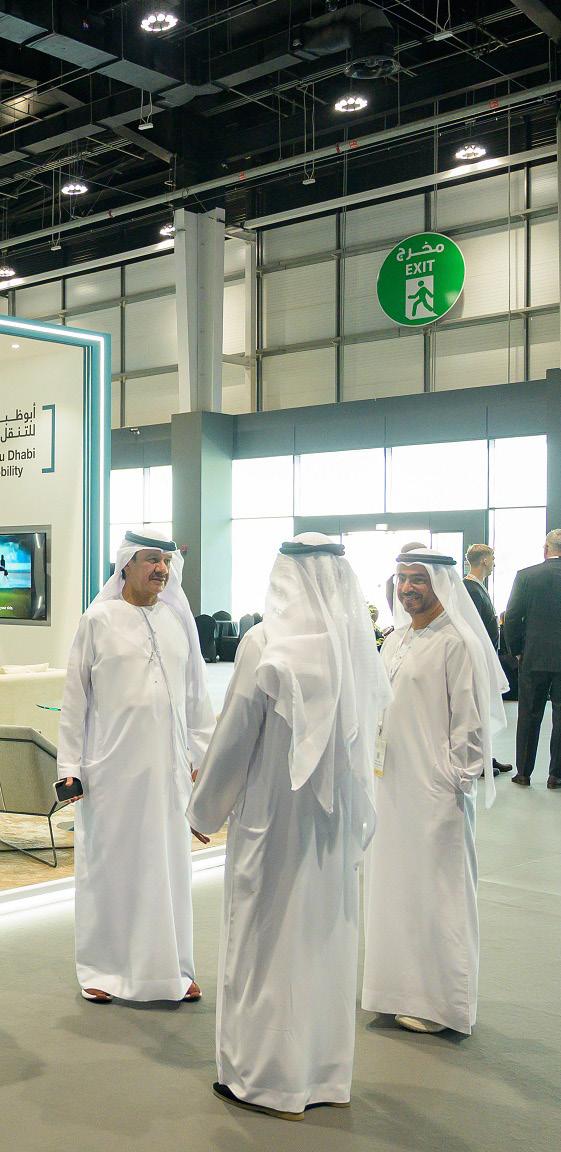
Looking ahead, Abu Dhabi Mobility has set a bold agenda for the future. Over the next five years, the Centre will focus on three primary goals:
1. Accelerating Sustainability: Expanding the electric and hydrogen-powered bus fleet, alongside investments in green infrastructure such as EV charging networks and active transport facilities.
2. Enhancing Multimodal Connectivity:
Integrating buses, maritime services, micromobility options (like e-scooters and e-bikes), and on-demand transport into a seamless network—anchored by smart mobility hubs.
3. Pioneering Digital Mobility:
Continuing to invest in AI, big data, and IoT technologies to offer predictive, responsive, and user-friendly transport solutions.
At the heart of this vision is the ambition to build a mobility system that is not only smart and efficient, but also deeply human-centric—designed around the needs, habits, and aspirations of its users.
Abu Dhabi Mobility is doing more than just modernising transport—it is reimagining what urban mobility can be in the 21st century. Through visionary leadership, strategic investments, and a firm commitment to sustainability, the Centre is positioning Abu Dhabi as a benchmark for intelligent, inclusive, and future-ready transport systems.
As cities around the world grapple with climate change, congestion, and outdated infrastructure, Abu Dhabi offers a blueprint for transformation—one where technology and humanity work hand in hand to move people better, faster, and greener.
www.admobility.gov.ae/en



Top 10 Mykonos 5 star stays

In the shimmering heart of the Aegean, Mykonos continues to reinvent itself without ever losing sight of what made it magnetic in the first place. The light still dances across whitewashed walls, the sea still hums with possibility, and year after year, the world returns, drawn not only by the island’s beauty, but by its unique ability to evolve in step with the desires of a global, ever-curious traveller.
Tourism in Mykonos has long been more than seasonal, it’s cyclical, almost ritualistic. There is a sense of return here, a rhythm that feels both anticipated and essential. But while the rituals remain, the winding strolls through Chora, the sunset applause in Little Venice, the hedonistic high tide of beach club season, 2025 marks a shift. Today’s Mykonos is not just about escape, it’s about experience. Not just about arrival, but about depth.
Over the past decade, the island has refined its offering with subtlety and intent. High-end hospitality has taken centre stage, but in a way that respects scale and setting. Instead of sprawling developments, there are discreet villas carved into hillsides, boutique hotels with a sense of place, and curated stays where personalisation matters more than opulence alone.

Wellness has also found its voice on the island. Yoga at dawn facing the sea, restorative retreats nestled away from the pulse of town, and spa experiences grounded in Greek tradition, these are now part of the everyday narrative of modern Mykonos. Visitors are increasingly drawn not just to parties, but to presence, the kind of travel that restores as much as it entertains.
And while Mykonos is rightly known for its vibrant beach club culture, the island’s culinary scene has become just as powerful a draw. Restaurants no longer rely on their view alone. Instead, chefs are sourcing from island farms, fishing daily, and reimagining Greek cuisine with confidence. Whether it’s a long lunch in Ano Mera or a tasting menu beside a firelit cove, dining here now tells a story of heritage, precision, and pure indulgence.
Culturally, too, Mykonos is deepening its voice. Local artisans, galleries, and boutique fashion houses are helping the island move beyond cliché into something more rooted. Traditional festivals are being celebrated with new energy. Design is echoing Cycladic motifs in contemporary ways. There’s a quiet pride in this, a refusal to be reduced to postcard simplicity.
And yet, simplicity is part of Mykonos’ enduring charm. The colours haven’t changed, blue, white, sun-gold. The pace is still yours to set, slow and serene in the morning, electric by nightfall. This ability to be both calm and wild, secluded and sociable, ancient and fresh, it’s what keeps the island on every traveller’s map, no matter how far the world tilts.
What makes tourism in Mykonos in 2025 especially compelling is that it no longer caters to a single kind of visitor. The island is fluid. It welcomes the solo traveller seeking solitude as much as the celebratory groups arriving for milestone moments. It offers both barefoot luxury and high-gloss glamour. It’s romantic, reflective, and riotous, sometimes all in the same day.
Access has never been easier, with direct flights from Europe’s major hubs and a new wave of concierge services making arrivals seamless and stress-free. Yet the core of the island remains delightfully off-script. The best moments are still the unplanned ones, a conversation with a local baker, a swim in a hidden cove, the glow of lanterns flickering along a quiet harbour.
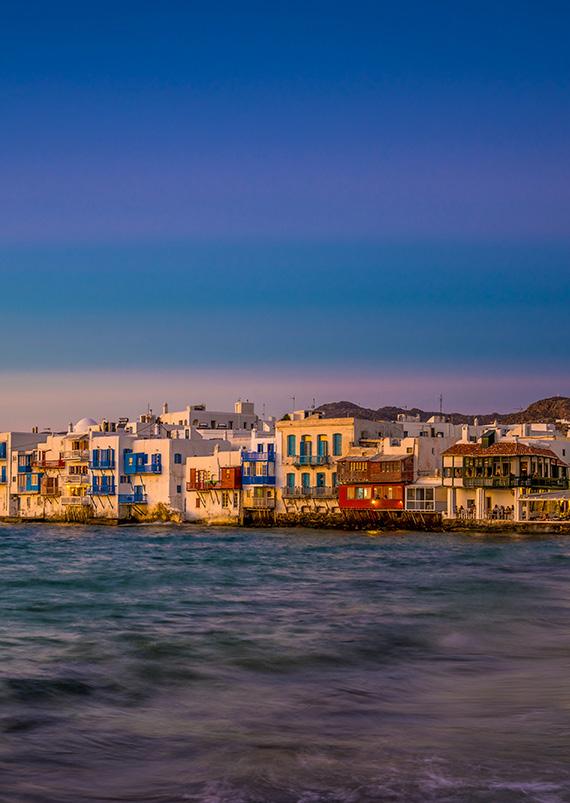
As sustainability becomes more than a buzzword, Mykonos is also making deliberate moves toward greener tourism. Several properties have adopted eco-conscious designs, solar integration, and water-saving systems. Local initiatives encourage travellers to respect the fragile ecosystem and support family-run businesses and traditional producers. This isn’t a reinvention, but a return, a way to honour the island’s natural abundance while preparing for its future.
In truth, Mykonos has never fit neatly into a box. It’s too textured, too contradictory, too alive. And that’s precisely why people keep coming back. Not to find something new, but to find themselves, slightly changed, in a place that somehow always feels the same.
Tourism here is not just about visiting. It’s about belonging, even if only briefly. It’s about understanding that luxury is not defined by excess, but by access, to space, to beauty, to joy.
In 2025, Mykonos doesn’t shout. It simply opens its arms, and the world, once again, walks in.
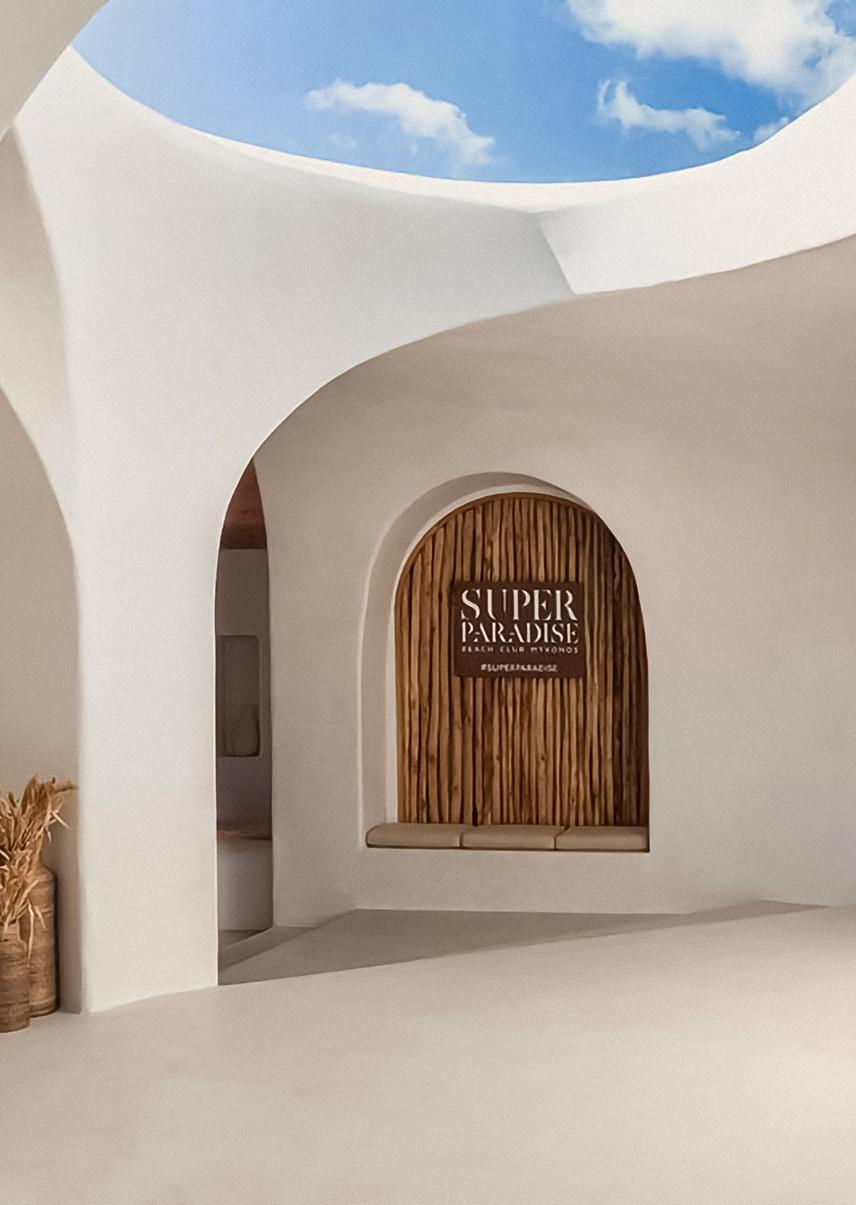
There are beaches that appear on postcards, and then there are places like Super Paradise. Radiant, immersive, and unapologetically alive, this Mykonos icon has long defied convention. Its golden sands and glittering Aegean waters have welcomed generations of travellers in search of freedom, beauty, and something a little extraordinary. Yet for all its worldwide recognition, Super Paradise remains, in spirit and in style, unmistakably its own.
Once a tucked-away enclave for those drawn to a more liberated rhythm of life, Super Paradise first captured attention in the 1970s, when word began to spread about a remote, sun-drenched cove where rules bent and self-expression flourished.

Over the decades, its reputation swelled, but rather than being eclipsed by its fame, the beach adapted. It transformed, gradually and organically, into one of Mykonos’ most iconic and energetic destinations. Today, it is still a place of exuberance, but with refinement, with elegance.
At the heart of this transformation is the Super Paradise Beach Club, a name that now resonates far beyond the shores of the Cyclades. What began as a low-key beachside bar is now a polished yet playful haven for global guests seeking barefoot luxury and sea-soaked celebration. The club’s most recent updates reflect a deeper understanding of its environment: architectural design shaped by the island’s


natural textures, warm neutral palettes echoing the surrounding terrain, and a seamless blend of open space and curated intimacy. It’s an atmosphere that respects Mykonos’ rugged beauty while elevating its global allure.
What makes Super Paradise so magnetic isn’t just its setting, though few would deny the sheer, visceral impact of its landscape. The real magic lies in the balance it strikes. One moment, the beach is a peaceful retreat where the lapping waves and salt-kissed breeze invite quiet reflection. The next, it becomes a vibrant open-air celebration, soundtracked by world-class DJs and lit by the Aegean sun. This fluidity, the ability to be both sanctuary and stage, is what continues to draw people back, season after season.
The experience here is layered. Lounging on a linen-draped sunbed under the Grecian sky, guests are offered more than just impeccable service, they are immersed in a culture that values ease and excellence in equal measure. Menus are inspired by the Mediterranean, yet globally aware. Cocktails are artfully constructed. The staff, trained to perfection, deliver the kind of hospitality that feels both effortless and exceptional.
For many, a visit to Super Paradise also means stepping into the iconic Jackie O’ Beach Club, a sister to the town’s celebrated waterfront bar. Equal parts theatrical and chic, the beach club is a


celebration of diversity, creativity, and hedonistic charm. It’s a place where the music never rests, the energy is infectious, and the dress code is delightfully expressive. Mykonos has long been known for its inclusivity, and nowhere is that better embodied than here, in a space where all are welcome, and all are free to shine.
Away from the dancefloor, the surrounding hillside now plays host to some of the island’s most tasteful accommodations. Villas overlook the bay with infinity pools that mirror the sky. Boutique properties like the newly opened Amyth of Mykonos offer privacy, design-led luxury, and an embrace of slow living. These are places crafted for those who seek tranquillity with a touch
of decadence, the quiet luxury of knowing everything is exactly as it should be.
And still, at its core, Super Paradise remains devoted to the simple pleasures: warm sand between your toes, a shared bottle of chilled rosé, the kind of laughter that only comes from days without deadlines. For all its polish and glamour, the beach retains a kind of soul, one born of its rebellious beginnings, its openness to change, and its refusal to become predictable.
This ability to evolve without erasing its essence is rare. While many destinations become polished to the point of sterility, Super Paradise leans into contrast. It thrives on rhythm and ritual, on indulgence and introspection. It doesn’t ask its visitors to choose between energy and elegance, serenity and spontaneity, it offers all of it, all at once.
What makes it particularly special in 2025 is its sense of identity. In a time when luxury can often feel homogenous, Mykonos, and Super Paradise in particular, holds fast to its sense of place. You can see it in the local stone used in architecture, in the Greek hospitality that underpins every interaction, and in the community of people who return year after year, not for novelty, but for familiarity reimagined.
For those who have walked its shores, dined beneath its cabanas, or danced as the sun dipped behind the hills, Super Paradise is more than a location, it’s a feeling. One that lingers long after the music fades and the suitcase is packed.
As Mykonos continues to define what modern Mediterranean living can look like, radiant, stylish, sensorial, Super Paradise stands as its most dazzling expression. A place that proves, again and again, that paradise isn’t static. It grows, adapts, seduces. And most importantly, it endures.
www.super-paradise.com




Tucked discreetly into the rugged hillside just moments from the heart of Mykonos Town, Cavo Tagoo is much more than a luxury hotel, it is a sensory experience, one where light, air, water, and taste are elevated into art. While the infinity pool and immaculate design are often what first draw the gaze, it is the dining; subtle, sun-drenched, and utterly unforgettable, that lingers long after the final sunset.
From the moment one steps onto the terrace of Meraki, Cavo Tagoo’s signature restaurant, it becomes clear that this is not simply about food. It’s about perspective, both visual and culinary. With uninterrupted views across the Aegean, and an atmosphere that shifts from gentle midday breeze to golden-hour
romance, the setting alone is enough to disarm. But what happens on the plate is a masterclass in how the old and new can meet in harmony.
The cuisine at Cavo Tagoo pays tribute to Greek roots while confidently embracing global influence. At its core is a respect for produce: tomatoes that taste like summer itself, olive oil so silky it needs no companion, seafood that arrives from sea to table within the same breath. But these ingredients are never predictable. Instead, they’re refined, layered, and composed with the precision of fine art.
Meraki, whose name fittingly means “to do something with soul, creativity, and love,” delivers a menu that mirrors

the Mediterranean spirit: bold yet clean, contemporary yet timeless. Dishes arrive like curated vignettes, delicate tartares, heirloom vegetables grilled to blistered perfection, octopus so tender it falls apart with the gentlest nudge. And always, the pairing: crisp Assyrtiko from Santorini, mineral-laced rosé, or a signature cocktail kissed with thyme and citrus.
What sets the experience apart is its immersive rhythm. Dining here isn’t rushed or overly formal, it’s experiential. There is a palpable connection between the culinary team and the landscape, a reverence for locality that gives even the most intricate dishes a sense of grounded
elegance. The chefs are present but discreet, their work revealed with quiet confidence. The service is intuitive, fluent in the language of hospitality, effortlessly translating guest desire into memorable moments.
Breakfasts at Cavo Tagoo are no less poetic. Served with the same sea-facing views, they offer an abundance of seasonal fruit, warm pastries, artisanal cheeses, and à la carte options ranging from traditional Greek omelettes to avocado toast elevated by unexpected touches like barrel-aged feta and za’atar.
As the day shifts and golden light softens




the stone walls, the property’s 40-metre aquarium bar becomes the next act in Cavo Tagoo’s culinary narrative. With marine life drifting behind the glass and ambient music setting the tone, guests gather here to sip and savour. The cocktails are precise, balanced, and deeply rooted in the island’s palette, think mastiha-infused spirits, fig, basil, and wild honey. It's a space designed not just for indulgence, but for reconnection, with yourself, with others, with the Aegean breeze.
What’s perhaps most striking about dining at Cavo Tagoo is its restraint. In an age of excess, there is something quietly luxurious about letting ingredients
speak for themselves, about presenting hospitality not as spectacle, but as something deeply personal. It’s this philosophy that defines the property as a whole, but nowhere is it felt more keenly than at the table.
Here, the culinary journey is not an afterthought to the design, it is its soul. From the lightest mezze to the most indulgent evening feast, Cavo Tagoo invites guests to slow down, to taste the island not just through its flavours, but through the calm, confident luxury of a meal well made, and a moment well spent.
www.cavotagoo.com/mykonos

Tucked away on the sun-kissed coastline of Mykonos, THE BEACH HOUSE is the kind of place that feels less like a holiday villa and more like a private slice of Greek island heaven. Designed with understated elegance and a deep respect for its Cycladic surroundings, it captures the essence of what makes Mykonos such an enduring destination: natural beauty, unhurried luxury, and a sense of peace that’s hard to find anywhere else.
From the moment you arrive, there's an overwhelming sense that every detail has been carefully thought through. The design is effortlessly chic – whitewashed walls, exposed stone, and soft, earthy textures that echo the landscape around it. It's luxurious, but not in a showy way. Instead, it feels warm and welcoming, a place you can immediately settle into. Whether you're lounging on one of the shaded terraces with a drink in hand, or simply watching the light dance across the Aegean Sea, there’s a quiet kind of magic to this place.

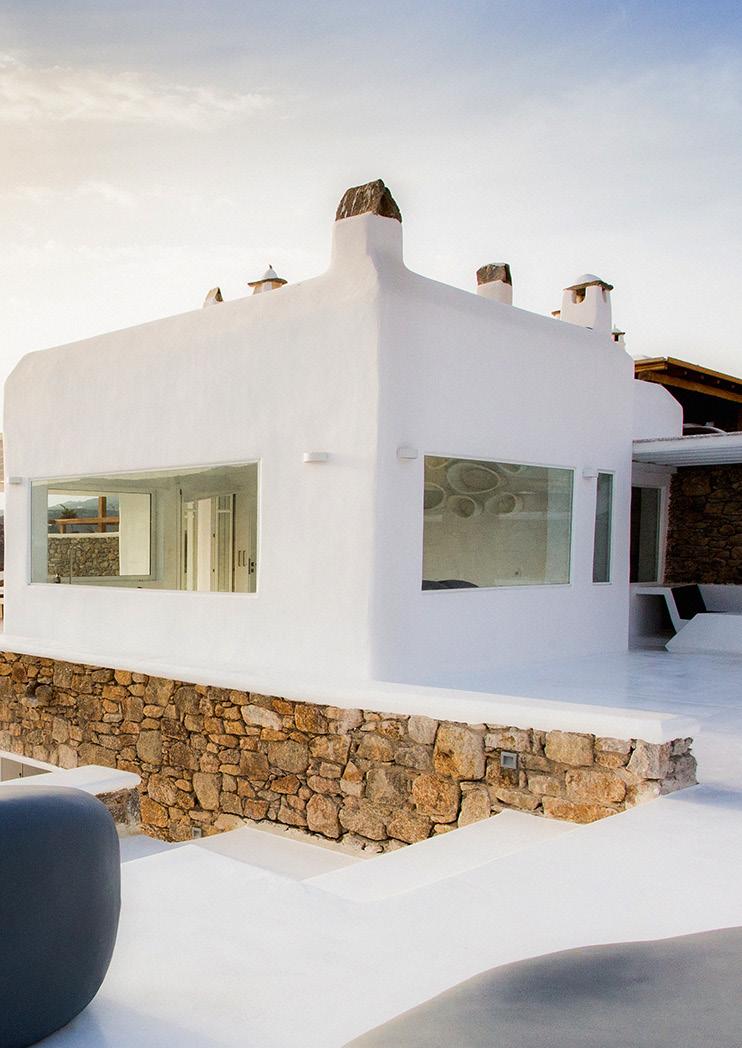
THE BEACH HOUSE isn’t just about beautiful surroundings, though there are plenty of those. What truly elevates the experience is the level of service. The concierge team offers what can only be described as an exceptional level of care, with a discreet, can-do approach that makes everything feel effortless. It’s not just about providing services, it’s about anticipating needs before you even realise you have them.
Need a private transfer from the airport? Sorted. Fancy a last-minute reservation at a hard to book restaurant? Done. Want a sunset picnic set up on a remote beach with no one else around? No problem. The concierge at THE BEACH HOUSE isn’t just there to organise things, they’re there to craft experiences. The team works closely with each guest to understand what kind of stay they want, and then quietly goes about making it happen.
One of the standout features is how truly personalised everything feels. If you're someone who enjoys privacy and calm, the team might suggest quiet spots on the island, arrange in-villa dining with a private chef, or set up a serene yoga session at sunrise. If you're after something more sociable or celebratory, they’ll open the doors to the island’s liveliest beach clubs, book VIP tables, or help organise an event right there at the villa. Every itinerary is bespoke, but never overdone. The tone
is always relaxed, never pushy.
Dining is another highlight. THE BEACH HOUSE itself offers the option of bringing in a private chef who will tailor menus to your tastes, from fresh seafood caught that morning, to traditional Greek dishes made with locally sourced ingredients. There’s something quite special about enjoying a candlelit dinner overlooking the sea, with the breeze rustling through the olive trees and nothing but the sounds of the island in the background. And if you’d rather explore Mykonos’s restaurant scene, the concierge can secure you a table at the most sought after spots, often ones you wouldn’t even know to ask about.
It’s this quiet confidence in the level of service that makes THE BEACH HOUSE stand out. It’s not loud or flashy. It’s grounded, calm, and deeply intuitive. For those looking to truly unwind, wellness offerings such as in-house massage treatments, meditation, and personal training sessions are easily arranged. Equally, for those looking to explore, day trips by boat, guided cultural tours, or even scuba diving excursions are all on hand, the team has built up a network of trusted contacts, so you’re always in good hands.
Guests often comment on how quickly they’re able to relax here. It’s the kind of place that encourages you to slow down and savour the moment, whether


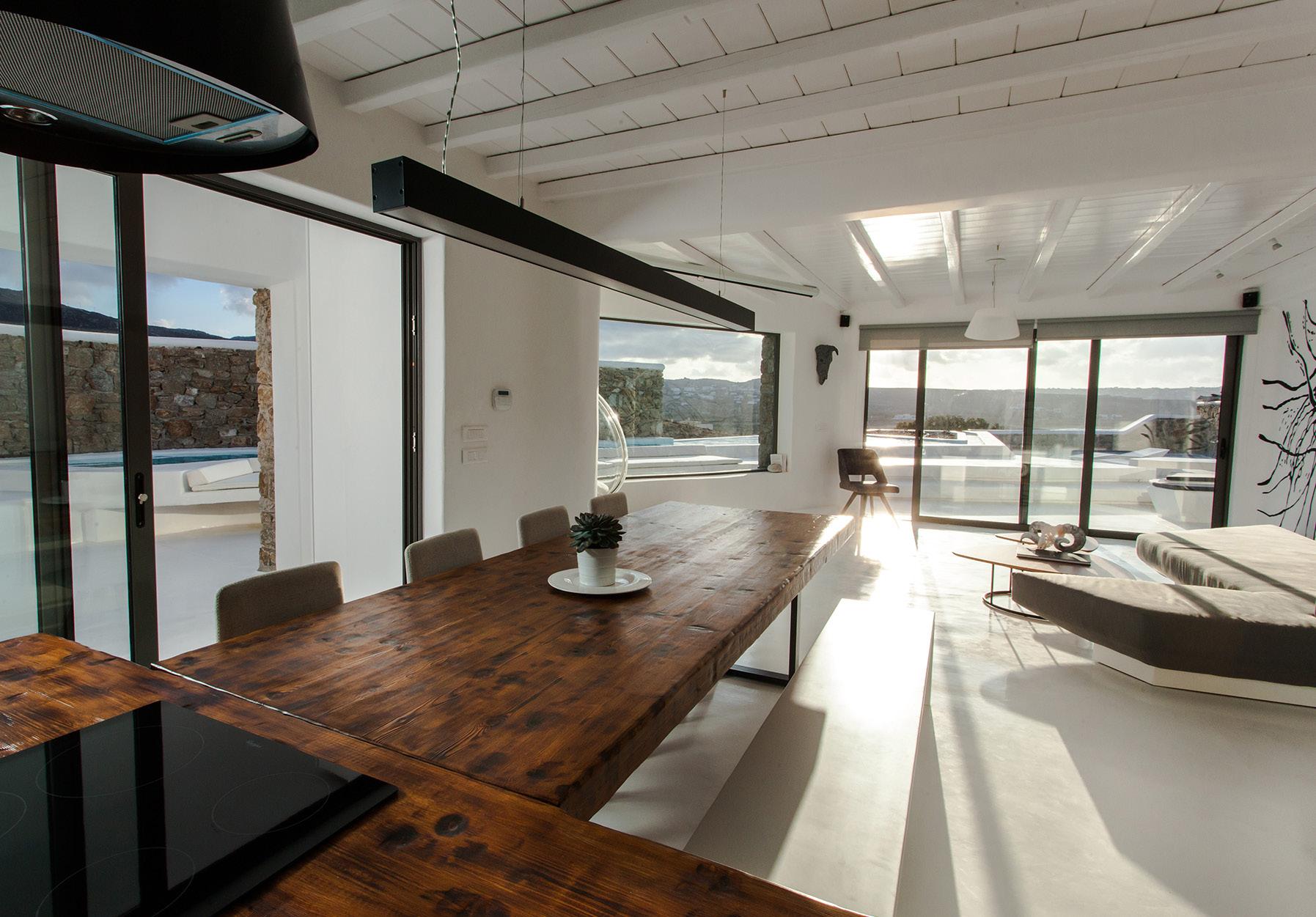


that’s sipping coffee at sunrise, reading a book by the pool, or spending long, lazy afternoons at nearby beaches. And it’s not just about catering to couples or solo travellers, families, groups of friends, even honeymooners all find something special in the calm, curated world of THE BEACH HOUSE.
There’s also a genuine care for the environment woven into the property’s ethos. Solar power, sustainable water use, and low impact materials reflect a commitment to keeping the island as beautiful as it’s always been. In a world where many luxury properties speak of sustainability without substance, it’s refreshing to see these values quietly upheld in everything from building materials to daily operations.
What’s most striking, though, is how natural it all feels. There’s no sense of formality, no script. The team simply lets the experience unfold, gently guiding it when needed, but always making sure the guest is in control. It’s this balance, between support and space, that’s so hard to get right, and yet THE BEACH HOUSE makes it look easy.
Ultimately, what THE BEACH HOUSE offers is more than just a place to stay. It’s a feeling, of ease, of stillness, of time slowing down. It’s a reminder of what a holiday should really be. And whether you stay for a week or a month, it leaves an impression that lasts long after you’ve left. A place to return to, time and time again.
To plan your stay or learn more, visit beachhousemykonos.com.

As the Mykonian breeze stirs through the palms and the horizon blurs in heat and light, one thing becomes clear, summer in 2025 has a new uniform. Enter In The Tropics, the SS25 collection from MAUVAIS, a brand increasingly synonymous with refined edge, bold seasonal style, and that unmistakable sense of cool that moves with clarity and purpose.
This collection is more than a wardrobe, it’s a mood. Inspired by the rhythm of warm nights and sun-soaked days, In The Tropics offers a curated escape into coastal ease and contemporary elegance. It’s a tropical narrative told not through prints and palms, but through texture, silhouette, and precision tailoring. Each piece is built to elevate, to move with confidence from island afternoons to rooftop evenings, from barefoot brunches to statement-led dinners.
At the heart of the SS25 collection are MAUVAIS’ signature matching sets, a design language the brand has mastered and pushed forward for the season. Wave textured co-ords return in a selection of fresh, sun season tones, blending movement and structure with an easy, understated flair. Luxurious linen sets bring breathability and refinement, perfect for the Mediterranean heat, while cotton crochet pieces add dimension, craftsmanship, and a soft, tactile edge that feels both modern and nostalgic.






The colour palette is clean and effortless. Shades of bone, faded terracotta, off white, soft olive, and sea glass blue create a natural warmth that reflects the island’s landscape. These aren’t colours that shout, but rather breathe, timeless tones that transition seamlessly from day to dusk. Cuts are relaxed, but never careless. Wide leg trousers fall fluidly, open collar shirts offer room to move, and detailing is precise, from custom buttons to subtle contrast stitching.
But MAUVAIS is not just about aesthetics. It’s about feeling, how clothing can shift a moment, change a posture, open a conversation. The brand has built its reputation on refined streetwear principles, and In The Tropics is the natural evolution of that ethos, stepping confidently into the realm of high summer sophistication without losing its edge. Each garment is a blend of tailored restraint and expressive cool, created for those who dress with intention, but never overthink it.


What makes this collection feel especially at home in Mykonos is the island’s inherent duality, relaxed yet electric, ancient yet modern, minimal yet endlessly expressive. MAUVAIS captures that same tension. These are clothes that can carry you from the stillness of a whitewashed terrace to the pulse of a late night gathering, without needing to be changed. They are designed not just to be worn, but to be lived in.
Accessories are equally considered. Lightweight outerwear, oversized sunglasses, and minimal slides round out the SS25 styling language, encouraging fluid, tonal layering and a sense of seasonless adaptability. It’s summerwear with continuity, built to cross borders and climates with ease.
Ultimately, MAUVAIS doesn’t tell you how to wear it, it creates a canvas for your own version of the season. Whether your summer unfolds in the Cyclades, the coastlines of Ibiza, or a rooftop garden in the city, In The Tropics ensures you look as relaxed as you feel, and as refined as the moment deserves.
It is clothing for clarity, for sunshine, for memory. It is style without compromise, and summer, distilled.
MAUVAIS.co.uk
Mykonos has long held its place as one of the Mediterranean’s most coveted destinations—where sugar-cube buildings meet turquoise waters, and golden beaches are just the beginning. But beyond its iconic party scene and postcard views, the island is also home to an extraordinary collection of five-star retreats that elevate the meaning of luxury. From cliffside villas with private infinity pools to beachfront resorts offering world-class gastronomy, Mykonos has mastered the art of indulgence.
Whether you're chasing serenity or sophistication, design-led minimalism or timeless elegance, these handpicked
properties represent the very best the island has to offer. Each one delivers a distinct flavour of Cycladic charm—paired with impeccable service, panoramic views, and all the modern comforts discerning travellers expect. Whether you're planning a romantic escape, a stylish celebration, or a sun-soaked retreat with friends, these ten luxury stays provide the perfect base from which to experience the magic of Mykonos.
In this guide, we explore the island’s top 5-star hotels—celebrated not just for their amenities, but for the unforgettable moments they inspire. Because in Mykonos, where you stay is just as memorable as where you go.
Set on a private peninsula overlooking Ornos Bay, Santa Marina blends five-star indulgence with Cycladic charm. This exclusive resort features lavish rooms, suites, and villas, an iconic Buddha-Bar Beach, a private beach, and world-class spa. Perfect for luxury seekers and jetsetters.
www. santa-marina.gr
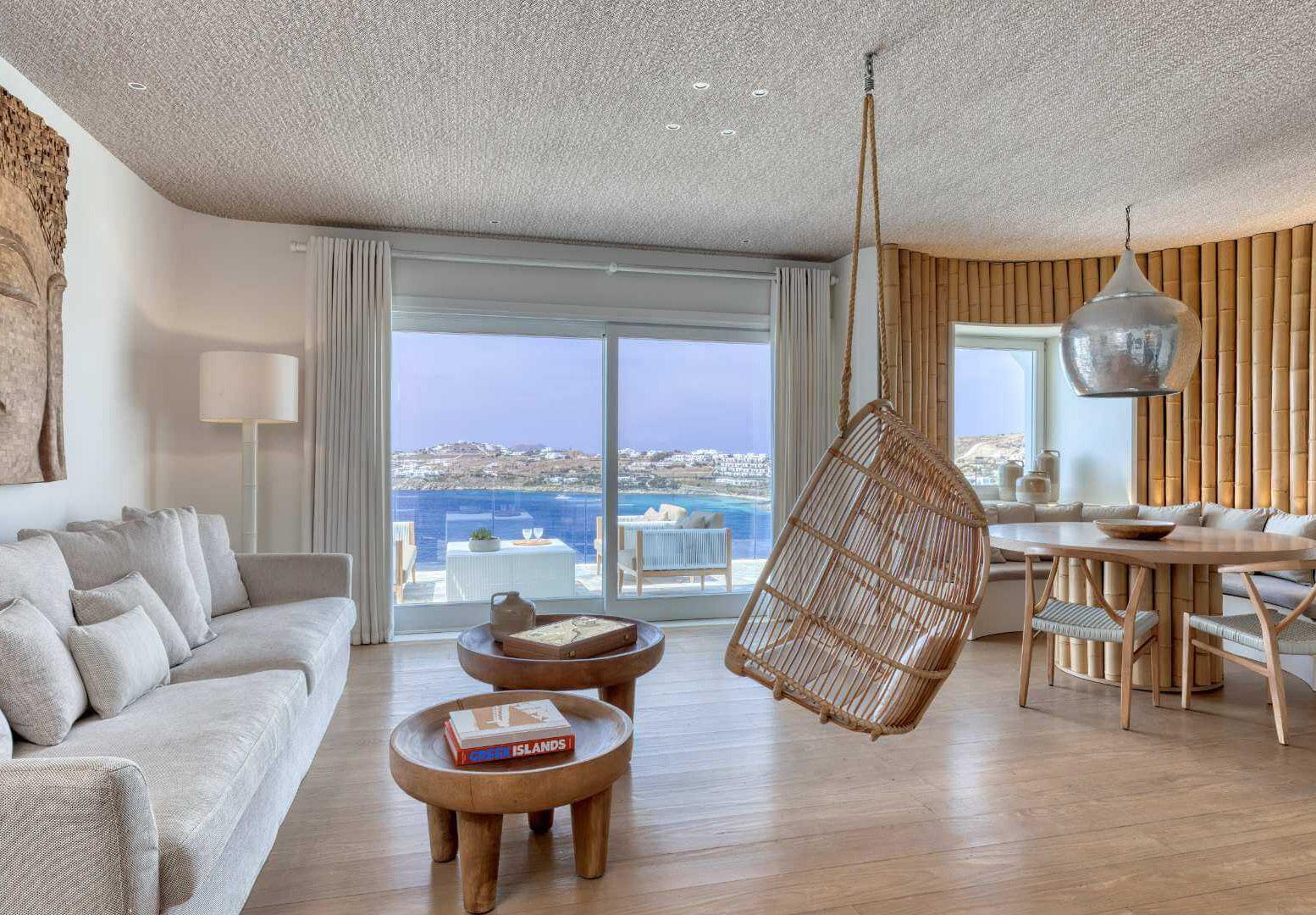

A serene, design-forward hideaway in Aleomandra, Kalesma offers whitewashed, villa-style suites with private pools and panoramic sea views. With its minimalist elegance, personalized service, and a holistic approach to wellness and gastronomy, Kalesma feels like a secluded village of understated luxury.
www. kalesmamykonos.com
Carved into a cliffside on the island’s east coast, Cali Mykonos is a haven of sleek minimalism and natural elegance. The resort offers private pools, a dramatic infinity pool, fine dining, and yacht access, all with sweeping views of the Aegean Sea. www. calimykonos.com


Perched above Psarou Beach, Mykonos Blu is an iconic resort known for its whitewashed bungalows, private pools, and ethereal aesthetic. With its infinity pool, luxe spa, and proximity to Nammos, it blends relaxed island vibes with refined Greek hospitality. www. grecotel.com/mykonosblu
A stylish, adults-only retreat in Agios Stefanos, Domes Noruz offers contemporary suites with private terraces and sea views. Known for its vibrant design, wellness focus, and lively social scene, it’s a perfect match for modern luxury lovers seeking both relaxation and energy. www. domesresorts.com/ domesnoruzmykonos

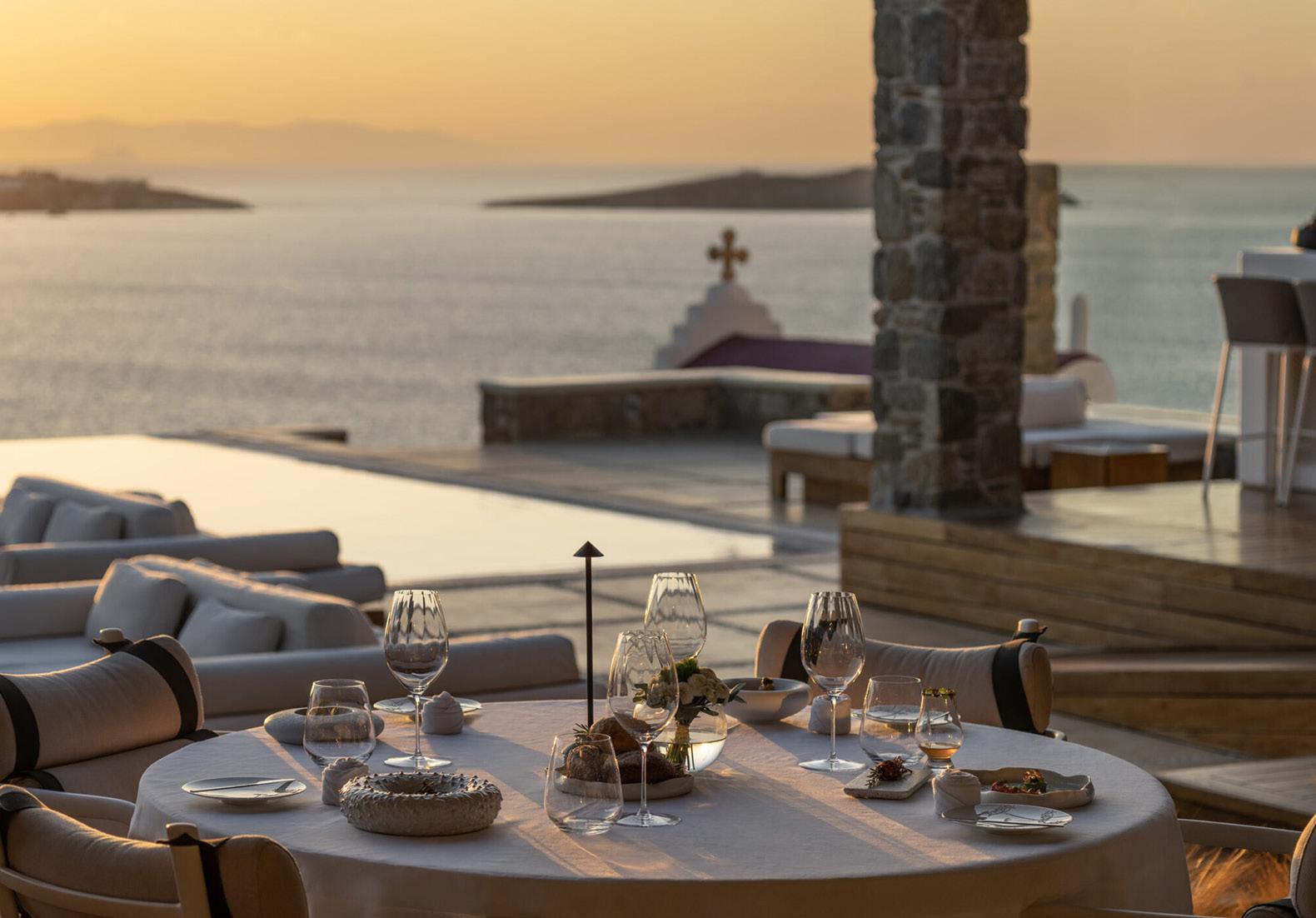
A chic, boutique hotel near Megali Ammos Beach, Bill & Coo is renowned for its sleek suites, infinity pool, and award-winning gastronomy. Its stylish ambience, tailored service, and romantic setting make it a favourite for honeymooners and design aficionados. www. billandcoo.com
Located in Agios Ioannis, Katikies blends Cycladic tradition with cutting-edge luxury. The resort offers immaculate suites, infinity pools, and gourmet dining, all wrapped in whitewashed elegance. Its tranquil setting and elevated service create an intimate yet indulgent experience. www. katikies.com/katikiesmykonos


Set across from the sacred island of Delos, Mykonos Grand delivers timeless luxury with sea-view rooms, a holistic spa, and amphitheatre-inspired architecture. Just steps from Agios Ioannis Beach, it’s ideal for wellness seekers, couples, and those craving serene sophistication. www. mykonosgrand.gr
Tucked into a dramatic cliffside above Kalafatis Beach, The Wild blends rugged beauty with organic luxury. Stone-clad suites and villas overlook the Aegean, with a serene beach, artisan design, and a slow-living ethos that’s effortlessly cool and authentically Mykonian. thewildhotel.com


An Instagram icon near Mykonos Town, Cavo Tagoo is famous for its cave-style suites, infinity pools, and glamorous vibes. With panoramic sunset views, a lively lounge scene, and curated experiences, it’s a celebrity favourite and the epitome of modern island luxury. www. cavotagoo.com/mykonos